Naira depreciates marginally on parallel FX market Citi sees Africa trading
Mahama: Nigerians Safe in Ghana,
Countries Are Brothers With Shared History
Insists no room for xenophobia in his country

Naira depreciates marginally on parallel FX market Citi sees Africa trading
Insists no room for xenophobia in his country
In-person enrolment begins August 25, commission targets first-time voters Partners NOA to boost voter mobilisation





























Kemi Badenoch has said she no longer identifies as Nigerian and does not hold a passport for the country.
The Tory leader, who grew up in Lagos and is of Yoruba heritage, said she had not had a Nigerian passport for two decades.
Badenoch said while she knew the country “very well” and had an interest in what happens there, she felt that her “home is where my now family is”.
Speaking on the Rosebud podcast, London-based The Telegraph, quoted her to have said: “I have not renewed my Nigerian passport, I think, not since the early 2000s. I don’t identify with it any more, most of my life has been in the UK and I’ve just never felt the need to.”
She added: “I’m Nigerian through ancestry, by birth despite not being born there because of my parents, but by identity I’m not really. I know
The Independent National Electoral Commission (INEC) yesterday announced that the nationwide Continuous Voter Registration (CVR) exercise will commence on August 18, marking a major step in preparations for the 2027 general elections. The exercise, announced on the official X (formerly Twitter) of the Commission, would allow eligible Nigerians who have yet to register, or who need to update their voter information, to do so ahead of the polls.
INEC said the CVR would take place across all States and the Federal Capital Territory,
West African States (ECOWAS) Protocols, especially pertaining to the free movement of persons and goods in the region
He gave the assurances while receiving President Bola Tinubu's special envoy led by Minister of State for Foreign Affairs, Ambassador Bianca Odumegwu-Ojukwu in the Presidential Palace, Accra.
He asked the special envoy to convey to his Nigerian
new tariff rates. Trump’s latest blitz triggered a wave of market jitters and fears for jobs in some of the poorest countries, as tariff rates were signed off ranging from 50 per cent to 10 per cent.
Owing to the move by the U.S government, Citigroup’s Head of Sub-Saharan Africa, Akin Dawodu, warned that the tariff regime targeting African countries could deepen the continent’s economic shift towards alternative global trade partners, particularly China, the European Union, and the Middle East.
In an interview, Bloomberg quoted Dawodu to have said the U.S. decision to impose tariffs of up to 30 percent on imports from South Africa, Algeria, Nigeria, and Ghana may further reduce Africa’s already marginal position in
the country very well, I have a lot of family there, and I’m very interested in what happens there.
“But home is where my now family is, and my now family is my children, it’s my husband and my brother and his children, in-laws. The Conservative Party is very much part of my family, my extended family, I call it.”
When her father, Femi Adegoke, who was a doctor, died in 2022, Badenoch said she had to get a visa to travel back to Nigeria, which she described as a “big fandango”.
The Tory leader was born in a private hospital in Wimbledon, South West London, in 1980 before her parents took her home to Nigeria.
She was one of the last people to receive birthright citizenship rules in Britain, before they were abolished by Margaret Thatcher the following year. Badenoch said she felt both British and Nigerian while growing up
targeting first-time voters, those who have changed locations, and individuals with lost or damaged Permanent Voter Cards (PVCs).
It stated that the CVR would commence on August 18th with online pre-registration of voters and would be followed by the in-person registration on 25th August 2025.
INEC Chairman, Prof. Mahmood Yakubu, had during a visit to the Director General of National Orientation Agency (NOA), Lanre IssaOnilu, said the electoral body had resolved to partner the agency on voter mobilisation ahead of the nationwide CVR and November 8 Anambra Governorship election and
counterpart that he should not lose sleep over recent protests against Nigerian nationals resident in his country.
He stated that Nigeria and Ghana were brothers with shared history, so, they would not allow anything to come between them.
Mahama noted that the recirculation of an old video made by a Nigerian residing in Ghana over 10 years ago actually generated tension,
American trade.
The naira depreciated marginally on the official forex market as it closed at N1,555 to a dollar, lower than the N1,550 to a dollar it closed the previous day. On the official arm of the forex market, the nation’s currency maintained its previous day’s value of N1,533 to a dollar yesterday.
Also, despite the development, the Nigerian stock market was unfazed as it closed on a positive note yesterday, as the All Share Index increased by one per cent to close at 141,263.05. Also, the market capitalisatioon of the Nigerian Exchange Group (NGX) increased to N89.373 trillion from N88.425 trillion as at the previous close.
The total volume traded closed with an exchange of
in Lagos. “Finding out that I did have that British citizenship was a marvel to so many of my
contemporaries, so many of my peers,” she said. “I think the reason that I came back here was actually a very
sad one, and it was that my parents thought, ‘there is no future for you in this country’.” ‘Never felt I belonged there’
She added that she remembered “never quite feeling that I belonged there” in Nigeria.
Deji Elumoye in Abuja
President Bola Tinubu yesterday, charged young Nigerians active in the digital media space to harness their platforms as instruments of national progress.
He urged them to build businesses that create employment, produce content that reflects unifying values, and serve as positive catalysts for societal development as well as emphasised the critical importance of verifying information before amplifying it.
Speaking in Abuja at the opening of the Progressives Digital Media Summit, themed "Unveiling the Critical Role of New Media in National Development," the President said: "Your generation has recognised this moment. You
the 2027 elections.
He said as the national election management body, the Commission was aware that its responsibility was multistakeholder and inter-agency in nature.
To succeed, Yakubu noted that they must engage all stakeholders and every national institution relevant to the commission's mandate, saying one of such national institutions is the NOA.
The chairman said the commission would like to explore further areas of partnership through its Voter Education & Publicity and other relevant departments, particularly with the recent creation of an Artificial
but gladly announced that the situation was swiftly managed.
The president who disclosed that the protesters were not up to 50, assured the envoy of the safety and protection of the lives, properties, and businesses of Nigeria and Nigerians in Ghana.
Earlier, the Minister of State for Foreign Affairs had thanked the president for his hospitality since the delegation arrived Ghana
1,079.170 million units valued at N26.85 billion traded in 34,488 deals. However, the market breadth was negative with 34 gainers as against 35 losers.
The White House announced the modified reciprocal tariff rates on Thursday.
Earlier in April, Trump had slammed sweeping tariffs on global trading partners, imposing 14 percent on Nigeria.
The “reciprocal” tariffs were later postponed for 90 days to allow for time to negotiate individual trade deals, with the deadline moved to yesterday. But there was a minor reprieve that opened the door to further negotiations, after the White House said the updated tariffs would take effect on August 7, and no longer yesterday.
For Africa, despite the extensions, most talks failed
are using digital tools to innovate, educate, and demand accountability. But as your influence grows, so must our collective sense of purpose and responsibility.
"I urge you to continue using digital platforms to advance our nation's progress. Build businesses that employ others. Create content that uplifts and unites. Use your influence to foster unity, not division."
He lauded the creativity and resilience of Nigeria's youth as he described digital media as a driving force of economic and social transformation.
According to him, digital media is no longer merely an accessory to life.
"From developing innovative platforms to building vibrant online communities, you are demonstrating the determination that is redefining
Intelligence (AI) Division under the ICT Department of the commission.
He added: “Another area where we need to strengthen our partnership is voter mobilisation. While INEC will continue its voter education efforts, the NOA should, working with other stakeholders such as the political parties, civil society organisations and the media, help in the area of voter mobilisation.
what is possible for this country.
"You are not waiting for the future; you are building it. Digital media is now a central driver of economic growth, civic engagement, and social change. It broadens representation for those previously unheard," he said Tinubu said his government was committed to supporting digital innovation through the National Digital Innovation Fund and policies that promote a thriving startup ecosystem.
He, however, warned practitioners to remain vigilant against disinformation and cyber threats.
Earlier, Chief of Staff to the President, Hon Femi Gbajabiamila, praised digital media practitioners who have consistently stood up for Nigeria and projected the nation positively on the global stage.
“The aim is to increase voter turnout and greater participation of the underrepresented demographics in our electoral process, particularly youths, women and Persons with Disability (PWDs).
She was clear that their mission was to douse the tension in Ghana following viral video against Nigerians.
She said Nigerians back home were apprehensive over the situation and concerned about the safety of Nigerian nationals in Ghana, their properties and and businesses.
Odumegwu-Ojukwu also said the visit was to equally facilitate the establishment of a permanent Nigeria-Ghana
to produce new agreements, triggering the rollout of increased tariffs under Trump’s revised global scheme.
In the continent, the US did not strike a single trade deal with any country, despite frantic efforts by several officials on either side of the divide. Nigeria was not initially included, but was later added as the policy evolved.
The new rates, which Trump sees as benefiting US exporters, create uncertainty for dozens of countries, including longtime US allies. They have also raised fears of inflation in the US, UKbased The Guardian reported. Meanwhile, Dawodu, has warned that the new U.S. tariff regime targeting African countries could deepen the continent’s economic shift towards alternative global
“It is for this reason that NOA has been included in the expanded membership of our Inter-Agency Consultative Committee on Election Security (ICCES). The Commission is also making efforts to revamp the National Inter-Agency Committee on Voter Education and Publicity (NICVEP) in which NOA will, again, play an active role.
“Your visit is coming at a critical time in our preparations for the Anambra State Governorship election holding on 8th November 2025, and the 2027 general election.”
“The nationwide Continuous Voter Registration (CVR) is
Joint Commission.
She said the joint commission would help in addressing the youth and issue of migration caused by huge demography of unemployed people under 45 years.
"We are encouraging our youth to stay in Nigeria and if it is necessary to migrate, they are to be great ambassadors," Odumegwu-Ojukwu said.
The Minister informed the Ghanaian President that she
trade partners, particularly China, the European Union, and the Middle East.
“China is already Africa’s largest trading partner, with the EU following closely. These new tariffs will likely accelerate that shift,” Dawodu said.
Dawodu said Africa’s vast natural resources, including 60 percent of the world’s remaining arable land and a third of its mineral reserves, make the continent indispensable to future industries—especially those powering artificial intelligence and advanced manufacturing.
“There are global markets for Africa’s resources; they don’t have to rely on the U.S.,” Dawodu added.
Dawodu noted that intraAfrican trade holds the key to long-term economic resilience.
In a goodwill message, Special Adviser to the President on Information and Strategy, Bayo Onanuga, while highlighting the significance of the summit noted that lessons from recent elections in countries like the U.S. and Germany underscored how digital media have become crucial battlegrounds— beyond mere entertainment—for shaping poll outcomes.
"However, social media is not a fair battleground. As a public square, it is often chaotic and unregulated. Users frequently disregard rules. Divisive content is rampant. Deepfakes and AI-generated content are increasingly used against political opponents. Posts are driven by clicks, not truth or accuracy. Misinformation spreads five times faster than official corrections." Onanuga observed.
scheduled to begin in about three weeks with the online pre-registration of voters on 18th August, followed by the in-person registration on 25th August 2025.”
Earlier, Issa-Onilu had said the mandate of NOA was to educate citizens on responsible citizenship, civic duties and creating awareness on election participation. He said that building patriotic citizenship is more important than building roads and bridges.
Isa-Onilu noted that governments at all levels must be intentional in delivering policies that will trigger patriotism to the country from citizens.
was meeting with Nigerians in Ghana to urge them to adhere to the laws of Ghana.
The Minister was accompanied on the factfinding mission by the Director, Africa Affairs Department in the ministry, Amb. Regina Ocheni; Director, Office of the Minister of State for Foreign Affairs, Amb. Innocent Iwejuo, and Special Assistant (Administration) to the Minister of State, Mr. Ajuluchukwu Eze.
He urged African governments to tackle nontariff barriers, including inconsistent legal frameworks, logistical bottlenecks, and labor mobility restrictions—issues that continue to hamper regional integration.
Dawodu highlighted the potential of the African Continental Free Trade Area (AfCFTA) to lift Africa’s global trade standing if effectively implemented. He added: “AfCFTA could increase Africa’s share of global exports to 4.4% by 2043, up from the current 3.5 percent. Africa’s growth will be increasingly propelled by its youthful population and rising consumer class. These are fundamentals that can withstand short-term disruptions like tariffs.”

Onyebuchi Ezigbo in Abuja
The National Association of Nigerian Nurses and Midwives (NANNM) has said that its leadership will meet today to consider offers made by the federal government to call off their strike.
The Coordinating Minister of Health and Social Welfare, Prof. Ali Pate, had told reporters after his closeddoor talks with the health workers yesterday that they have agreed to suspend their warning strike.
Addressing journalists shortly after the meeting with the leadership of NANNM, Pate said the decision to call off the strike was part of the agreements reached between
the government and the association.
However, the union leaders said that they were going back to consult with their organs before deciding to suspend the four-day old warming strike.
The union leaders failed to confirm the deal with the government when confronted by journalists at the Federal Ministry of Health and Social Welfare in Abuja, venue of yesterday's meeting.
Speaking on the outcome of the discussion with the Minister of Health, NANNM’s Public Relations Officer, Omomo Tibiebi, said though they have received offers from government, they are yet to formally suspend their strike
He said the union’s
Adedayo Akinwale
The Obaship tussle rocking Onikoyi Royal Family of Ikoyi and Imoba took another dimension as the royal family has made public a full court judgement document detailing the dissolution of the Onikoyi Council of Chiefs and removal of five prominent chiefs of Ikoyi and Imoba land.
The court judgement was published in one of the national dailies, not THISDAY, on July 28 and July 31, 2025 alongside a press release signed by both the Olori Ebi and General Secretary of the Onikoyi Royal family, Otuba A.G.K Onikoyi and Akin Fafunwa respectively, yesterday.
According to the the published court judgement, Adedotun Adeseye, Samuel Fafunwa, Sule Onikoyi, Moshood Onikoyi and Folarin Animashaun have been restrained from parading themselves as Odofin; Lisa; Ashipa; Eletu Omo; and Aro of Ikoyi and Imoba land respectively.
The royal family in a statement issued yesterday said Lagos State High Court judgement with suit N0. LD/2434GCMW/2016, which was reportedly delivered by His Lordship, Justice O.O. Ogunjobi on July 3, 2025, declared the appointment of the listed individuals as chiefs of Ikoyi and Imoba land null and void citing lack of due process and non-adherence to the Obas and Chiefs’ Laws of Lagos State in their selection and appointment.
The Onikoyi Royal Family said that they recognise that the erroneous approval of the concerned individuals as chiefs by the Lagos State governor was allegedly done in poor judgement and upon devious, corrupt and grossly misrepresented facts.
They, therefore, called the attention of the public, Lagos State governor, and other concerned authorities to the court judgement annulling the selection and appointment of the aforementioned persons as chiefs of Ikoyi and Imoba land.
National Executive Council will meet today to assess the federal government’s response before deciding on the next steps.
“There will be a National Executive Council meeting by tomorrow (Saturday), and that's when a decision will be
made, and we will know if what the federal government has promised is good enough for us to suspend the strike,” he said.
Nurses and midwives under the association had commenced a nationwide warning strike on Tuesday,
July 29 over demands for improved welfare packages.
The strike, which disrupted normal operations in public health institutions across the country, caused pain to families of patients.
The nurses’ demands include the upward review of shift allowance, adjustment of uniform allowance, implementation of a separate salary structure for nurses, increased core duty allowance, mass employment of nurses, and the creation of a dedicated nursing department in the Federal Ministry of Health.
Emmanuel Addeh in Abuja
Nigeria's Dangote Group has appointed a former head of Oman's Duqm refinery, David Bird, as chief executive of its petroleum and petrochemicals business.
This is coming as it strives to overcome production challenges and advance its next wave of expansion, S&P Global reported yesterday.
Effective July 2025, David Bird, the new pick, stepped in as CEO of the Dangote Group's fuels and petrochemicals business, which commissioned the world's largest single-train refinery last year, the report said.
However, Dangote Group founder, Aliko Dangote, will stay on as chairman of the refining business and CEO of the wider conglomerate, which is also active in cement, fertilizers and sugar
refining, the report added.
The business is expected to tap Bird's experience expanding the Duqm refinery and diversifying its crude slate as CEO of OQ8, a role he adopted months before the Omani complex began its first test runs in 2023.
In written comments to Platts, Part of S&P Global Commodity Insights, Bird said his focus at Dangote would involve advancing the group's footprint beyond the Nigerian market and across the African continent.
As CEO of the refining business, he will be responsible for ensuring maximum output and efficiency for the refinery, and aims to make the group a leader in the global market, he said in a LinkedIn update.
The appointment comes after a string of unit upsets and "design issues" that have stalled the ramp-up process of
the 650,000 bpd refinery, while its leadership has called out a hostile business environment for challenging its operations.
Since it was commissioned in January 2024, Dangote has quickly grown its market share in the Nigerian fuel sector, displacing large volumes of petrol imports that the country once relied on.
However, Aliko Dangote has railed against "rent-seeking" trade partners and substandard fuel imports for putting strain on the business.
In a previous interview with Platts, Bird emphasised a trading-led approach to achieve a competitive edge in the refining sector, with a focus on high utilization rates, efficiency and feedstock flexibility.
His approach aligns with a recent shift from the Dangote complex to process a wider range of crude grades, partially
spurred by limited availability of the Nigerian oil it was designed to process.
But the Nigerian refinery is still obliged to sell fixed volumes of its oil products into the domestic crude market under a naira-based trade agreement with the Nigerian National Petroleum Company (NNPC), a 7.2 per cent stakeholder in the business.
As the Dangote Group eyes its next wave of growth, it plans to expand the capacity of the Lagos refinery to 700,000 bpd, build out port infrastructure and establish foreign storage assets in Namibia and other countries, the S&P report added.
In August, the $20 billion facility located in Lagos is set to roll out its own distribution business with a fleet of 4,000 Compressed Natural Gas (CNG) powered trucks.
A coalition of civil society groups across various sectors that cut across the energy sector, development sector, transparency and oil watch entities as well as energy fields trackers in Nigeria, have hailed the performance of the Group Chief Executive Officer (GCEO) of the Nigerian National Oil Company Ltd (NNPCL), Engr. Bashir Bayo Ojulari.
The Coalition of Civil Society Groups and Professionals for Good
Governance(CCSGP), described Ojulari’s accomplishments as groundbreaking and multifaceted in terms of recording applaudable increase in NNPCL’s profitability, excellent and transparent remittances to the Federation Account, commendable collaborations with upstream partners in a strategic move to boost and catalyse enhanced oil and gas production in Nigeria as well as transparent monthly financial and operational
reports, which have been in abeyance for about eight years.
The CCSGP, which praised President Bola Ahmed Tinubu for head-hunting excellent professional as Ojulari, said the NNPCL boss has within just 100 days in office repositioned the NNPCL in terms of revenue generation transparency, increasing remittances, organisational profitability, operational efficiency and capability and enhanced relations with host communities, stakeholders and
industry upstream partners. The group alleged that fifth columnists and dirty politicians used to milking the NNPCL dry by refusing to declare profits, render monthly reports, but only engage in poorly executed or nonexistence contracts are trying to fight to distract Ojulari in an attempt to derail the noble reforms and excellent vision of President Bola Ahmed Tinubu in the energy sector which has seen the NNPCL rebound in just three months.

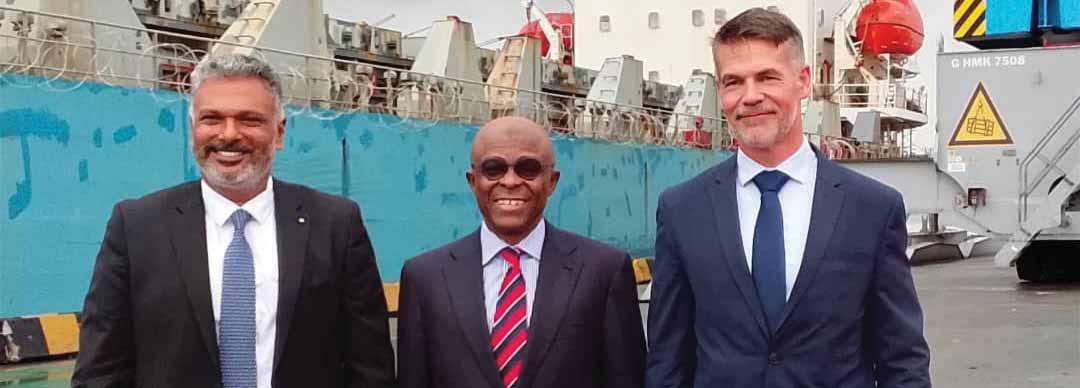
The federal government has opened discussions with the Nigerian Association of Chambers of Commerce, Industry, Mines and Agriculture (NACCIMA) aimed at establishing strategic collaboration on Nigeria's economic reform programme, with emphasis on correcting longstanding structural distortions to build a more resilient and inclusive economy.
The talks held in Abuja, yesterday, when the Minister
of Finance and Coordinating Minister of the Economy, Mr. Wale Edun hosted a delegation from NACCIMA, led by the Director General, Mr. Sola Obadimu.
Receiving the delegation, the minister underscored the President Bola Ahmed Tinubu-led administration's commitment to leveraging the private sector as a key driver of Nigeria's economic growth and development.
Edun highlighted recent progress in strengthening the local currency, attracting
Group Rejects Bill Seeking to Make Sultan, Ooni Permanent Co-chairmen Council of Traditional Rulers
Adibe Emenyonu in Benin City
A group, Ogbakha-Edo, yesterday, demanded for the immediate withdrawal in its entirety of the proposed bill before the National Assembly which seeks to constitutionally enshrine the Ooni of Ife and the Sultan of Sokoto as permanent co-chairmen of the Nigerian Council of Traditional Rulers.
Besides, it demanded that the position be made nonpermanent and rotational
amongst the first-class traditional rulers in the country.
The group in a statement on behalf of Benin people signed by Prof. Sam Guobadia and Dr. Andrew Osaretin Izekor, Chairman and Secretary of the group, respectively, said "We reject in totality, any attempt to undermine or diminish the authority of the Oba of Benin. According to the group, "We find it highly inappropriate to perpetually subjugate the Oba of Benin by way of an illogical constitutional enactment."
Pharmacists Declare NAFDAC Directive on Members Unlawful
Pharmacists under the aegis of the Association of Communality Pharmacists of Nigeria (ACPN) have declared as unlawful, a directive by the National Agency for Food and Drug Administration and Control (NAFDAC) to all operators in the recently sealed drug markets in Idumota, Lagos, Ariaria in Abia, and Head Bridge, Onitsha to register with the agency.
NAFDAC had instructed the pharmacists under the listed places to register its premises for a national database.
The National Chairman of
ACPN, Pharm Ezeh Amrose Igwekamma, said the directive by NAFDAC was too difficult to ignore, and an attempt to usurp the constitutional powers of the Pharmacists Council of Nigeria (PCN), adding that the action could disrupt the pharmaceutical sector of the nation’s economy.
‘’The ACPN observed with distress a recent directive by NAFDAC decreeing all operators in the recently sealed Idumota in Lagos, Ariaria in Abia, and Head Bridge markets to register with NAFDAC on a certain portal for a national database.’’
diaspora and domestic capital, as well as reducing import dependence through increased local production.
A statement issued by the
ministry said the meeting discussed strategic collaboration on Nigeria's economic reform programme, with a focus on correcting long-standing
structural distortions to build a more resilient and inclusive economy.
Earlier, the Director General NACCIMA, Obadimu
commended key reforms of the present administration, notably the removal of fuel subsidies and the unification of the exchange rate.
Ahmad Sorondinki in Kano
Business owners, mostly non-indigenes, in Sabon Gari area of Kano State have been displaced from their legitimate businesses following the closure of their shops by the Kano State Government.
The closure of shops and business premises has led to the displacement of business owners mostly from the Southsouth and South-east regions of Nigeria.
One of the affected shop owners alleged that government officials acting
on the directive of the State Ministry of Land and Physical Planning, swooped into the Sabon Gari commercial district overnight and padlocked multiple business outlets.
"I arrived at my shop this morning to begin preparing food for our morning customers only to see it locked with a government padlock.
"All my food items—meat, vegetables, drinks—are trapped inside. They will all go bad in a matter of hours. Who is going to pay me back for this loss?"
lamented Mrs. Nkechi Ugwu, who runs a small restaurant
along France Road.
Another affected trader, Mr. Ayodele Makinde, who owns a household electronics shop, expressed dismay over the indiscriminate nature of the government’s action.
"This is not just about money anymore. It is about injustice. We are tenants. We pay our rent dutifully to landlords. If there’s a levy issue, it’s between the government and the property owners. Why punish us?"
A cosmetics vendor, Joy Onuorah, shared her frustration. "I am a widow with three children. This business is
how I survive. Now my shop is under lock and key. No notice, no dialogue—just oppression. We are being punished simply because we are non-indigenes."
Many of the shops comprised a range of businesses, including grocery stores, boutiques, restaurants, salons, and electronics outlets, as well as various small and medium-sized enterprises. However, officials of the Ministry of Land and Physical Planning cited the non-payment of annual tenement rates by property owners as justification for the action.
Segun Awofadeji in Gombe
Gombe State Governor, Muhammadu Inuwa Yahaya, has officially launched a 620KW small hydropower-solar PV hybrid system for communities around Balanga Dam in Balanga Local Government Area.
The hybrid system combines small hydropower and solar photovoltaic technologies to deliver clean and reliable electricity to deliver clean and renewable energy aimed
at stimulating local enterprise, raising living standards and contributing to national goals for green industrialisation.
Represented by the Deputy Governor, Dr. Manassah Daniel Jatau, Governor Yahaya yesterday described the project as a major milestone in the state's journey toward energy security, rural electrification and industrial development.
He emphasised that the launch is in line with his administration's broader agenda of infrastructural development,
economic empowerment and environmental sustainability.
"This project is timely and strategic. It speaks directly to our vision of self-reliance, sustainability and inclusive growth. Power is the backbone of modern development, and this system will transform lives, stimulate agriculture, create jobs and enhance the standard of living in Balanga and beyond," the governor noted.
Funded by the European Union (EU), the Global
Environment Facility (GEF) and the Federal Government of Nigeria through the Rural Electrification Agency (REA), the project is being implemented by the United Nations Industrial Development Organisation (UNIDO). It is the first of its kind in Nigeria. According to project officials, REA is scheduled to commence the solar PV component within two weeks, while UNIDO will complete the small hydropower component by January 2026.
Adibe Emenyonu in Benin
City
The Edo State Governor, Senator Monday Okpebholo, has approved the nomination of four persons as
commissioner designates. Governor Okpebholo also approved the removal of his Special Adviser on Oil and Gas, Mr. Felix Isere, for financial infraction over unauthorised organisation of
oil and gas summit slated for August 7. Those nominated are Nosa Adams, Yakubu Oshiorenua, Dr. Felix Ehiguese Akhabue, and Prof. Omorodion Ignatius Ikponmwosa.
Their nomination was signed by the Secretary to State Government (SSG), Musa Ikhilor, and made available by the Chief Press Secretary to the governor, Mr. Fred Itua.


L-R:
Yinka Kolawole in Osogbo Osun State Governor, Ademola Adeleke, is not defecting to African Democratic Congress (ADC) nor aligning with anybody within the ADC ahead of the 2026 election in the state.
Spokesperson to the Governor, Mallam Olawale Rasheed, disclosed this in a statement,
in response to media publications and enquiries. He affirmed that Adeleke remained in the Peoples Democratic Party (PDP) and was going to win, with wide margins, the 2026 governorship elections on the platform of the PDP.
The statement read: “Our attention has been drawn to
news reports and media enquiries about the imminent defection of Governor Adeleke to the ADC or alignment with ADC bigwigs ahead of the 2026 governorship race. There is no truth in those publications and speculations.
“First of all, we, the PDP Osun, have already adopted and endorsed President Bola Ahmed Tinubu for the 2027
presidential election, so there is no alliance with ADC.
“Secondly, Governor Adeleke has no alliance with anyone in ADC. He remains in PDP, will run in PDP, and needs no alliance with ADC to win with a wide margin in 2026.
“The Osun electorate supports Governor Adeleke because of his impressive performance
Chuks Okocha in Abuja
Former Minister of Communications, Adebayo Shittu, has warned President Bola Tinubu against replacing Vice President Kashim Shettima in 2027.
Shittu, who was minister during the administration of former President Muhammadu Buhari, warned that replacing
Shettima would endanger Tinubu’s second-term bid.
He disclosed this during an interview in one of the national television stations monitored from Abuja.
There has been speculations that Tinubu may pick another vice presidential running mate ahead of the 2027 election.
But the presidency had dismissed such claims, stressing
that the President would make his decision known when election campaigns start officially.
However, Shittu said:
“Shettima was not nominated as vice president because of whatever cleavage he had with ANPP, on his own merit he got it. Shettima as a person merits it, so to start clinching on history is not part of it.
“I would vote for Shettima
any day because he merits it, he is a very intelligent vice president. I don’t know what he has done for people to think that he would act differently. I don’t think Shettima deserves any prevarication on his continuity in Tinubu’s team.
“If there are any such suggestions from any quarters, I think we must be very careful about it.”
A new report by Singaporebased international mobility platform, Multipolitan, has named Abu Dhabi, Dubai as jurisdictions with the most friendly tax regime, and viable destinations for high-net-worth Nigerians seeking to grow and preserve their wealth.
The flagship publication titled, ‘Wealth Report 2025: The Taxed
Generation’ identified beyond tax-competitiveness, variables as legal stability, and strong governance as drivers of these two cities, securing for them top spot in the category, alongside Singapore, ranked third in the report.
The new publication offered key insights into the cities best positioned to preserve and protect wealth in today’s evolving global landscape.
The report further features two other indices such as the Wealth Preservation Cities Index (2015–2025), which ranks Zug, Hong Kong, and Basel as top cities for maintaining purchasing power over the past decade; and the Smart & Sustainable Cities Index 2025 spotlighting Wellington, Copenhagen, and Singapore for their climate resilience, digital infrastructure and future-focused planning.
Multipolitan identified that nations that pair beneficial tax regimes with robust economic and legal structures are ideal for long-term wealth management. It found the report suitable for high-net-worth Nigerians and families increasingly exploring global mobility to secure access to international markets, seek educational opportunities, and asset protection, amid a complex economic climate.
Peter Uzoho
Stakeholders in the Nigerian oil and gas industry including asset operators, investors, policy makers and regulators will next week in Lagos engage in robust discussions on ways the sector can support the federal government in achieving its $1 trillion economy target by 2030. At this year's Nigerian Annual International Conference and Exhibition (NAICE) organised by the Society of Petroleum Engineers (SPE) Nigeria Council, the two Ministers of State for Petroleum Resources - Heineken
Lokpobiri (Oil) and Ekperikpe Ekpo (Gas) will lead discussions at the event.
The conference with the theme, ‘Building a Sustainable Energy Future: Leveraging Technology, Supply Chain, Human Resources, and Policy’, will also have the Chief Executive Officer of the
Nigerian Upstream Petroleum Regulatory Commission (NUPRC), Gbenga Komolafe; Group Chief Executive Officer (GCEO) of the Nigerian National Petroleum Company Limited (NNPC), Bayo Ojulari, amongst others setting the tone for deliberations at the summit.
since he came to office. That good work is still ongoing and Osun people are committed to sustaining the delivery of good governance by re-electing Governor Adeleke in 2026,” the spokesperson said.
“Governor Adeleke urges PDP members to forge ahead with the ongoing strengthening of the party structures across all levels to prepare for fresh victory next year,” the statement concluded.
Sunday Ehigiator
As part of activities marking the 2025 World Hepatitis Day, the Surulere Chapter of the Association of Medical Laboratory Scientists of Nigeria (AMLSN) recently organised a free hepatitis screening outreach at the Surulere Local Government Secretariat, offering residents a chance to know their status and receive health education on the dangers of the disease.
The outreach brought together medical laboratory professionals who volunteered their time and expertise to screen residents for hepatitis B and C, educate them on modes of transmission, and
promote preventive practices. Speaking at the event, a medical laboratory scientist, Mr. Daniel Obichi, described hepatitis as a silent killer that does not receive as much attention as other viral infections despite its deadly impact.
“Hepatitis is not gender sensitive. Anyone, man, woman, or child can be infected. That’s why we are here today, to raise awareness and encourage people to get tested,” he said.
Obichi stressed that while hepatitis could be transmitted through blood and, to a lesser extent, sexual contact, it was not a death sentence if detected early.
Wale Igbintade
Oando Foundation, in partnership with the Nigeria Climate Innovation Centre (NCIC), has launched the Green Youth Upskilling Programme (GYUP), a bold initiative aimed at equipping Nigerian youths with practical skills for the emerging green economy.
The inaugural meeting of the programme took place at Ibera Hall, Radisson Blu Anchorage, Victoria Island, Lagos.
In her welcome address, Head of Oando Foundation, Tonia Uduaimoha, said the initiative is designed to bridge
Nigeria’s green skills gap while supporting sustainable development. She noted that the programme is informed by a comprehensive needs assessment and focuses on equipping participants with skills required to maintain both imported and locally manufactured green technologies.
Uduaimoha urged participants to take the training and mentorship seriously, emphasising that in a country with high youth unemployment, those selected are fortunate to be part of the programme.










































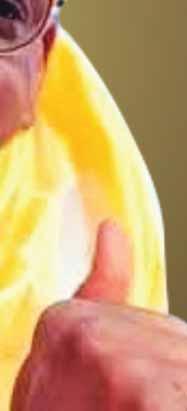



































Blessing Ibunge in Port Harcourt
The federal government through the Nigerian Ports Authority (NPA) has launched a 349 loading capacity Nigerian indigenous vessel ‘Ocean Dragon’ in Onne Ports, Rivers State.
The launching of the West Africa Container Terminal (WACT) to ECMT Calabar vessel of Clarion (MC Ocean Dragon), attracted commendations to the government of Nigeria led by President Bola Tinubu.
Unveiling the vessel yesterday, the Managing Director of NPA, Abubakar Dantsoho, stated that the achievement aligns with the Nigerian Ports Authority’s
vision to deliver efficient port services in a safe, secure, and customer-friendly environment while becoming the maritime logistics hub for sustainable port services in Africa.
Commending the Clarion Shipping for the landmark acquisition and WACT for its appetite for partnership and collaborations that propel business growth, Dantsoho said apart from the high loading capacity of 349 TEUs and several other distinctive features of the vessel, MV Ocean Dragon is wholly Nigerian.
He said the achievement speaks to the Renewed Hope “Nigeria First” policy of President Tinubu and the Nigerian Ports Authority’s renewed orientation towards
Author and education advocate, Mrs. Olubunmi Aboderin-Talabi, has challenged young Nigerians to reject the growing notion that education is a scam, affirming that quality education remains a powerful tool for personal and national development.
Speaking recently at the prize-giving and graduation ceremony of Dominican College, Mafoluku, Lagos, Aboderin-Talabi, who was the keynote speaker, described education as the gateway to skills such as creativity, civic engagement, innovation, and global relevance.
“When I saw the theme, ‘Education is Not a Scam’, it made me smile. This school is boldly confronting a misleading message being spread online. Don’t be deceived—education offers a lifetime advantage,” she said.
Drawing on examples from successful Nigerians, she urged the students to see formal education as a platform for self-discovery and growth. “To make sure education isn’t a scam in your life, you have to do your part. Your teachers provide the tools, but it’s up to you to build with them,” she added.
The event also featured cultural displays, poetry, and a send-off address by social justice advocate Victoria Ibezim-Ohaeri, who charged the students to shape their futures with confidence and courage.
Delivering the send-off address titled, ‘The Audacity to Stand Out’, the founder of Spaces for Change, IbezimOhaeri, urged the students to take ownership of their future. She said, “You now have both the pen and the clay. Use the pen to write the life you want, and the clay to mould yourself into that person. Don’t let anyone bury your dreams, not marriage, not motherhood, not society."
The highlight of the ceremony was the captivating poetic charge titled, ‘Echoes of the Titans’, by Oluebubechukwu Nwokeoma, an SS3 graduating student, praising her peers’ resilience and determination.
In their remarks, the school principal, Mrs. Ngozi Anozie and school administrator, Rev. Fr. Daniel-Mario Ibezim, encouraged the graduating students to uphold the values of Dominican College as they move forward.
Nigerian content development. Speaking on the speedy growth of the Onne Port, Dantsoho said "The studies of traffic around Onne in recent times has indicated that in terms of container traffic, 15 per cent of what comes here goes to Calabar,
and then about 20 per cent of what also comes here goes to Onitsha and Aba. Another 20 per cent goes to the far North, the remaining per cent stays here for oil and gas activities and other industry related activities.
"This thing is showing very quick growth. The extent in which the increase is being witnessed is very pleasing. You have to connect this to the policy of the government."
He said, "The government has created an enabling environment
through the policy of 'Nigeria First', which is also embedded in the policy of Mr. President of the Renewed Hope. Our own industry that we are witnessing today is becoming more hopeful and investing more time, energy and money and is practical.
Olawale Ajimotokan in Abuja
The Director of Communications and Stakeholders Management at the Nigeria Extractive Industries Transparency Initiative (NEITI), Mrs. Obiageli Onuorah, has expressed excitement at her investiture with the National Christian Award.
The policy strategist, whose career has been marked by dedication to public service, and who has played a pivotal role in shaping stakeholder engagement and public discourse in Nigeria’s extractive industries, was one of the recipients of the award
recognised for her service to the country in the Captain of the Industry category.
Onuorah, who was full of zest at the occasion held at National Christian Centre, Abuja, said the awards presented a golden opportunity for her and other awardees to recommit to serve the country better, and recommit to share the vision of making a Nigeria that works for everyone.
“The award means a lot. It's not every day that as a Christian you are recognised for your work in the public service. We are not politicians. So, many times we are like unsung heroes. This award
provides the opportunity for us to come together and celebrate one another, recommit to serve our country better, and recommit to share the vision of making a Nigeria that works for everyone.
“It encourages me to know that somebody somewhere is watching the sacrifices of public service that we do daily in the discharge of our responsibilities. So, I'm not taking it lightly. I'm so very excited about it,” Onuorah reckoned.
Onuorah’s commitment to excellence is reflected in her robust academic background. She holds a graduate degree in English from
Ahmadu Bello University and a Master’s in Communication and Media Arts. She is also an alumna of two prestigious international institutions: Columbia Law School at Columbia University New York, and the School of Public Policy at Central European University in Budapest Hungary. Her global outlook is further enriched with the fellowship granted her by the United States on its prestigious International Visitor Leadership Programme on Sustainability and the Extractive Industry, a testament to her leadership in media and governance.
Charles Ajunwa
Nestle Nigeria has empowered 49 rural women retailers in Agbara, Ogun State, as part of the expansion of its flagship initiative, Nestle Empowering Rural Women in Nigeria.
Now in its fifth year, the Nestle Empowering Rural Women in Nigeria project has
empowered over 382 women across the country, enabling them to expand their businesses by as much as threefold.
Through tailored business training, product grants, and mentorship, the initiative supports women in building more profitable retail ventures, reinforcing Nestle’s commitment to inclusive growth at the
community level. With the addition of the 49 new participants from Agbara, the project has now reached a total of 431 women.
At the opening ceremony in Agbara, Corporate Communications, Public Affairs, and Sustainability Lead at Nestle Nigeria, Victoria Uwadoka, said “Nestle Empowering Rural
Women in Nigeria is about creating genuine opportunities for women. Supporting rural women to scale their retail operations by up to 300 per cent within just three months is not only beneficial for business but also essential for fostering a more inclusive economy, stronger families, and resilient communities.”
The National Boundary Commission (NBC) has blamed the Ikot Essien community in Akwa Ibom State for sabotaging the boundary demarcation efforts between them and Atan Abam in Abia State through launching attacks on their neighbours, thereby raising tensions in the area.
The Akwa Ibom community, having been notified of days when the Boundary
Commission would embark on the definition of the boundary, allegedly attacked Atan Abam farmers on the disputed land, dealing machete cuts on some of them, while they kidnapped about four men who are still being looked for.
A letter from the Director General of the Commission, Surveyor Adamu A. Adaji to the Deputy Governor of Abia State and Chairman of Abia
State Boundary Committee, Ikechukwu Emetu, dated July 28,.2025 with reference number NBC.SEC.4/S.1/VOL.VIII, titled, ‘Re: Complaint Against Ikoyi Essien Community, Akwa Ibom State’ regretted the action of Ikot Essien. "I write to acknowledge receipt of your letter on the above-referred subject, dated 16th July, 2025. It is indeed disheartening to receive such
report of violence on the Atan Abam community by the people of Ikot Essien
"The commission frowns at this disturbing development, having achieved so much in the definition processes of the inter-state boundary. The field activities outlined for implementation from 21st July, to 25th August, 2025, have been stalled by this ugly development.
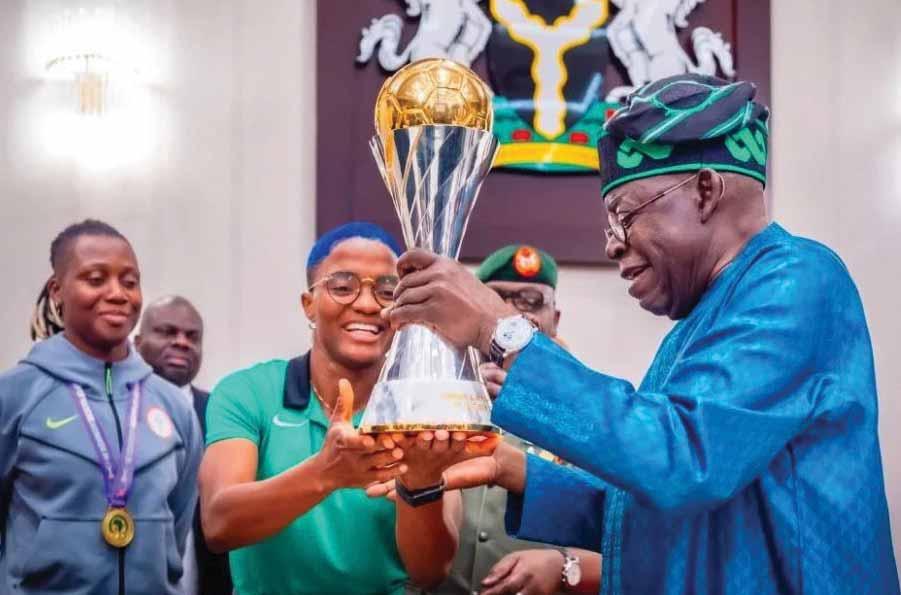
A major feat...
How is sport an instrument of diplomacy?
Over the years, sport has been a vital avenue for social and political interaction. Since the classical age, when ancient wrestling competitions and other sports brought together representatives from different empires who were not only interested in entertainment but also in discussing issues relating to their relationships. In the 21st century, sporting competitions such as football, basketball, and cricket have fostered a spirit of teamwork and solidarity among fans and spectators. In 1980, sport wielded some linkages with the international political system as it was being used to achieve both positive and negative interests of political leaders. It can serve as a positive force when used by states to foster friendly relations with others, but also as a negative influence when exploited to promote hostility. Participation in sporting activities has been influenced by diplomatic programmes of individual states. This was how the term ‘sport diplomacy’ came about—the extent to which a state utilizes sport for its national inter-
-
est. Segun Odegbami described sport diplomacy as a win-win situation. As an instrument of diplomacy, sport is valuable as a tool for influence and for making friends. Sport can be perceived as another traditional tool of statecraft that allows nations to make bold statements about their positions on various issues, and it can be characterised as a form of ‘soft power’. Through participation or non-participation in international sporting events, countries can effectively propagate their reactions to global issues. Sporting participation promotes dialogue and cultural understanding, encourages global excellence, and fosters healthy competition among nations. For example, in 1971, the United States sought improved relations with the People’s Republic of China, sending a table-tennis team for a friendly exchange, which became known as “Ping-Pong diplomacy”. Conversely, non-participation can sow discord, as seen in the 1984 Olympic boycott by the Soviet Union and its allies, in retaliation for the US-led boycott of the 1980 Moscow Games. Put it differently, engaging or disengaging in sporting events depicts the positive or negative relations between states. Theophilus Agofure Tabuke, Lagos State University
THE SATURDAY NEWSPAPER
EDITOR OBINNA CHIMA
DEPUTY EDITOR AHAMEFULA OGBU
MANAGING DIRECTOR ENIOLA BELLO
DEPUTY MANAGING DIRECTOR ISRAEL IWEGBU
CHAIRMAN EDITORIAL BOARD OLUSEGUN ADENIYI
EDITOR NATION’S CAPITAL IYOBOSA UWUGIAREN THE OMBUDSMAN KAYODE KOMOLAFE

THISDAY NEWSPAPERS LIMITED
EDITOR-IN-CHIEF/CHAIRMAN NDUKA OBAIGBENA
GROUP EXECUTIVE DIRECTORS ENIOLA BELLO, KAYODE KOMOLAFE, ISRAEL IWEGBU
DIVISIONAL DIRECTORS SHAKA MOMODU, PETER IWEGBU, ANTHONY OGEDENGBE
DEPUTY DIVISIONAL DIRECTOR OJOGUN VICTOR DANBOYI
SNR. ASSOCIATE DIRECTOR ERIC OJEH
ASSOCIATE DIRECTOR PATRICK EIMIUHI
CONTROLLERS ABIMBOLA TAIWO, UCHENNA DIBIAGWU, NDUKA MOSERI
DIRECTOR, PRINTING PRODUCTION CHUKS ONWUDINJO
TO SEND EMAIL: first name.surname@thisdaylive.com
WI have come across some leaders who are only interested in how to squander the money in their care. In the same vein, I have seen Hon. Aliyu Bello, current Chairman of APC Nasarawa State, a man for whom I have so much respect. He is an advocate of the masses. He has organized football competitions where the youths exhibited their talents in Nasarawa State.
At the football competition held at the popular Lafia Township Stadium, the competitors went home with fabulous prizes in various categories. Aliyu Bello has called on his colleagues to emulate his gesture on youth development. It is unusual to see such an astute and unassuming politician like him. Aliyu Bello is instrumental to the development of major roads in Nasarawa State, has contributed meaningfully in the area of education by purchasing GCE forms for the less privileged, and destitute. Indeed, he has given hope to the hopeless, and voice to the voiceless. He fought poverty, and he conquered it.
I opted to be his disciples because he believes in Allah and takes his prayers seriously. He is dutiful to God.
In the area of ICT, he organized free computer training for youth in his domain and has made many youths in Nasarawa State computer literate. He is humble. He drives himself around.
He is also a cheerful giver, ready to do everything humanly possible to assist members of his constituency In the area of health, Aliyu Bello lives up to the saying that “cleanliness is next to godliness”, believing that only in a clean and good atmosphere can sound health be guaranteed.
In reference to the new Trump golf course Eric stated that it was wonderful because “We had an unlimited budget and we exceeded it.” Quite an achievement! This all sounds funny until you consider who is in charge of the US and its economy. Melbourne, Australia
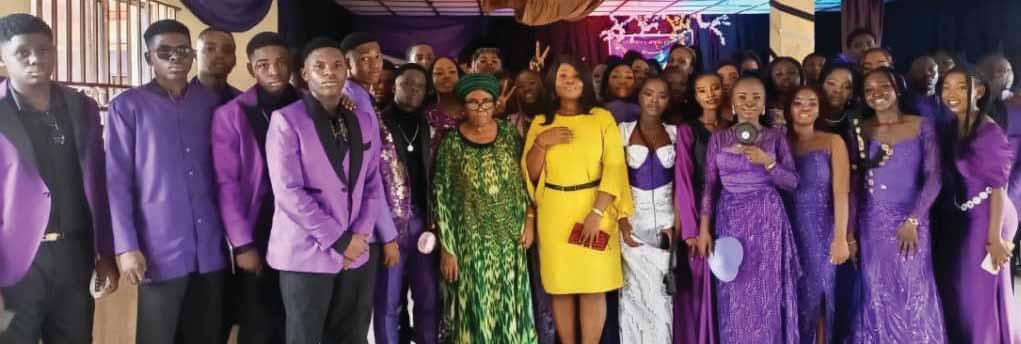
Proprietress, De Gloryland College, Lagos, Mrs. Maryann Igbinovia (on green outfit) and
Lagos...recently
Linus Aleke in Abuja
The Ministry of Police Affairs yesterday countered the insistence by the Police Service Commission (PSC) that the ongoing admission into the Nigeria Police Academy, Wudil, Kano State, 12th Regular Course Degree Programme, is null and void.
The ministry, in a statement signed by the Director of Information and Public Relations Unit, Bolaji Oladimeji Kazeem, challenged the stance of the PSC, stating that the ongoing application is valid and the admission process followed due
process in line with the National Universities Commission (NUC) and Federal Ministry of Police Affairs guidelines.
Earlier, the Police Service Commission in a statement on Thursday, urged the public to disregard the said advertisement as it is not aware and necessary
stakeholders' input was not sought or received.
These stakeholders, the commission said, include the Ministry of Police Affairs, Federal Character Commission, and the Nigeria Police Force, who were not consulted before the said release of the advertisement by the
Emmanuel Ugwu-Nwogo in Umuahia
The delay in completing the Inland Dry Port(IDP) located at Isiala Ngwa, Abia State, 19 years after the federal government initiated the project, has not gone down well with Governor Alex Otti.
The Abia governor expressed his dissatisfaction over the non-execution of the project when he received officials of the Nigerian Shippers Council, in his office.
I formerly known and addressed as EKOP, AMBLESSED AKAN and EKOP, UYAI-ABASI AKAN, now wish to be known and addressed as EKOP, AMBLESSED UYAIABASI. All former documents remain valid. The general public should please take note.
I formerly known and addressed as EKOP, FAVOUR AKAN and EKOP, MFONIDO-ABASI AKAN, now wish to be known and addressed as EKOP, FAVOUR MFONIDOABASI. All former documents remain valid, The general public should please take note.
I formerly known and addressed as HABIBASULEIMAN GARBA, now wish to be known and addressed as HABIBA SULEIMAN GARBA. All former documents remain valid, The general public should please take note.
"Isiala Ngwa IDP was wellpositioned from the initial conceptualisation. But, for it to remain on the drawing table for 19 years, something is definitely wrong," he said.
Ground breaking ceremony for the commencement of the project was performed during the administration of President Olusegun Obasanjo and after clearing the site, work became
frozen.
Otti, therefore, called on the federal government to initiate urgent intervention and address whatever challenges that have been stalling the construction of the needed infrastructure that would make the Isiala Ngwa Dry Port to become operational. He noted that the delay in making the dry port operational constitutes a major economic
loss to Nigeria, signalling that there was something fundamentally wrong with the implementation of the project.
The governor stated that reliable rail connectivity was needed to ensure the viability of inland dry ports because moving goods from the seaports to the IDPs requires the cheapest and most efficient mode of transportation, which is rail.
Nigeria Police Academy, Wudil. But in a swift reaction yesterday, the Police Ministry, in a counter statement, disowned the Commission, saying, "The attention of the Nigeria Police Academy, Wudil, Kano State, and the Federal Ministry of Police Affairs has been drawn to a misleading and inaccurate disclaimer issued by the Police Service Commission (PSC) on 31st July 2025. We wish to categorically state that: 'The application for admission into the 12th Regular Course Degree Programmes of the Nigeria Police Academy is valid. The admission process is ongoing and follows due process in line with the National
Universities Commission (NUC) and Federal Ministry of Police Affairs guidelines. "The PSC has no constitutional role in university admissions, and its statement is therefore legally baseless and misleading. All interested applicants and the general public are advised to disregard the said disclaimer. The online application portal remains open as earlier advertised."
Meanwhile, the PSC stated that the said advertorial, which was placed in flagrant violation of the required procedure, was an undisguised attempt to undermine the Commission, which has the Constitutional Mandate to recruit, including through the Academy.
Film in the Park Festival to Organise Screenings, Live Performances
Ferdinald Ekechukwu
The Film in the Park (FLIP) second edition will feature over 10 film screenings, live performances, story telling, and community engagement.
promises to be bigger, bolder and even more impactful. With meet and greet with the film producers, business networking, musical performances by upcoming artistes, relax and watch and fun games.
The Edo State chapter of Peoples Democratic Party (PDP) has asked the state Governor, Senator Monday Okpebholo, to focus on delivering quality, impactful, and people-oriented projects — not chasing shadows or basking in borrowed achievements.
The PDP also noted that most of the achievements of the Okpebholo administration
exist only in press statements, propaganda, half truths and falsehood to cover its glaring failure.
In a statement by the Publicity Secretary of the party, Chris Nehikhare, yesterday, and made available to journalists in Benin City, the party said the only visible milestone after nine months at the Dennis Osadebey Avenue currently occupied by the governor, remains a string
of disjointed press briefings and photo ops — all designed to create a false impression of progress.
According to Nehikhare, "Contrary to the propaganda being churned out by the Okpebholo administration, the Benin-Asaba Expressway reconstruction project was initiated, structured, and finalised under the immediate past PDPled administration of Governor Godwin Obaseki."
James Sowole in Abeokuta
Ogun State Government has commended the German Development Agency (GIZ) over its support for sustainable economic and skill development projects in the state. The partnership between the state and the GIZ has led to the execution of various economic and skill development
projects, including the recent establishment of job and work centres at Government Science and Technical College, Idi Aba, Abeokuta.
The Convener, Tomiwa Precious Otun, who stated this, explained that FLIP, which will take place on Sunday, September 21, 2025 at Freedom Park, Broad Street, Lagos Island between 4p.m. and 7p.m., creates a space where "emerging African filmmakers share authentic stories that reflect our realities, resilience, and creativity.
"Following the remarkable success of our maiden edition in 2024, this year’s FLIP film festival
“Remember the first time you went to the cinema for the first time, the flickering lights, the complete darkness , do you remember the awe you felt and the sense of togetherness you felt with the other viewers as you watched the scenes play across the screen and how you left the cinema feeling like you just returned from another world and how that feeling and glow followed you into the week?
Firm Plans Employee Assistance Programme Summit, Wellness, Health Insurance
Employee Assistance Programme Summit, which focuses on employee wellness through social and health insurance, has been announced by Sages and Scribes Consultants.
The workshop drew no fewer than 70 participants comprising 55 relevant partners from both public and private sectors, including high level political sectors network, policy makers, civil society organisations, and development partners in the field of sustainable development and GIZ staff.
The state Commissioner for Industry, Trade and Investment, Mr Adebola Sofela, gave the commendation at the opening of Second Joint Partners' Workshop of the GIZ Sustainable Economic Development Cluster (SEDEC), held in Abeokuta, the state capital.
The event is scheduled to hold on August 13 to14, 2025 in NECA HOUSE, Event Centre, Alausa, Ikeja under the theme, ‘Employee Wellness: The Imperative of Social and Health Insurance’.
The summit brings together HR professionals, insurers, healthcare providers, and policymakers with the aim
of advancing discourse on employee wellness in the Nigerian workplace. The Employee Assistance Programme (EAP) is a vital workplace benefit offered by employers to support employees and their immediate families.
EAPs provide timely, confidential interventions for a wide range of personal and work-related challenges— including stress, anxiety, depression, substance abuse, legal and financial issues, and family concerns.
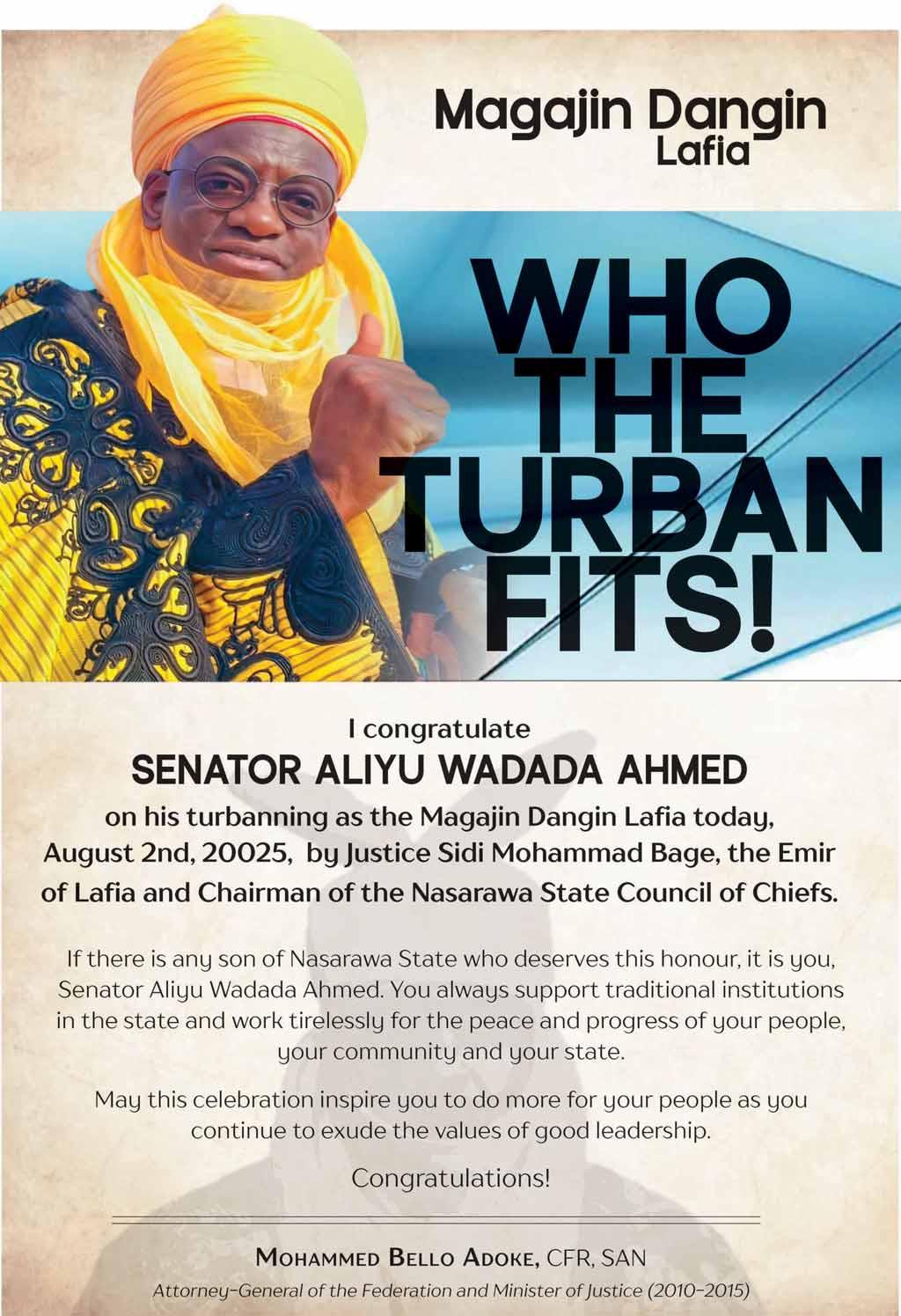
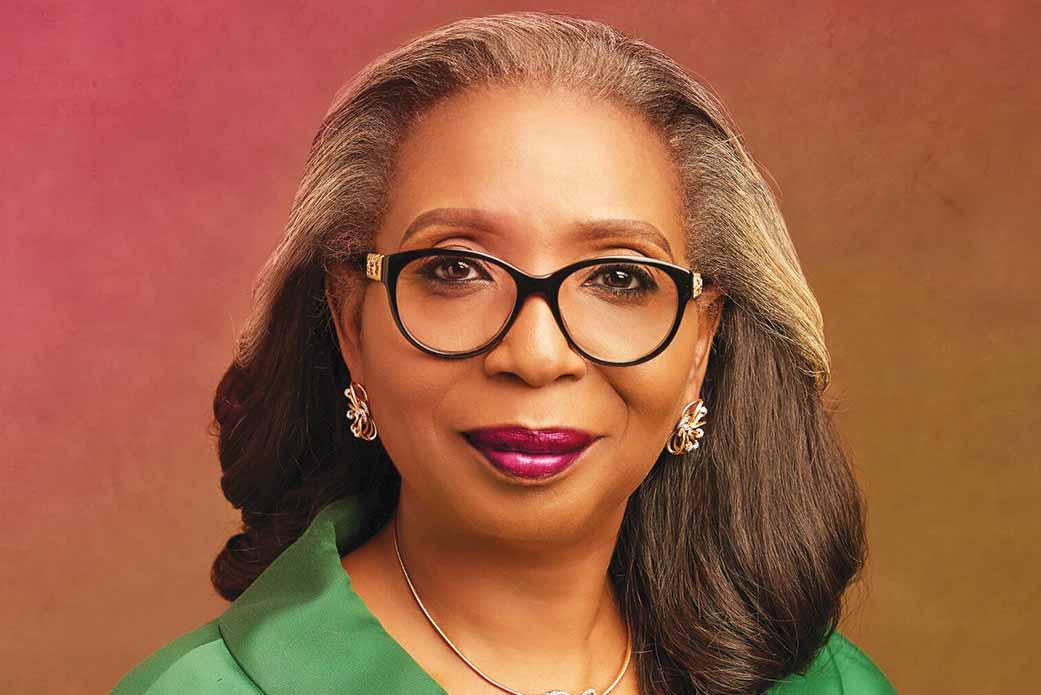

In a world where personal ambition often overshadows collective progress, Mrs. Ibukun Awosika stands out as a rare breed and a trailblazer whose success is incomplete without lifting others along. The former Chairperson of First Bank of Nigeria Limited; founder of The Chair Centre Group; Founder, Ibukun Awosika Leadership Academy (IALA) as well as Founder of the African Marketplace, Dubai, has not only shattered glass ceilings in the corporate world, but she’s also dedicated her life to multiplying opportunities for others, especially women and young entrepreneurs. To her, success is not a private trophy but a shared legacy. In this engaging conversation, Awosika opens up about her passion for entrepreneurship, not just as a means to earn a living, but as a powerful tool for empowerment and transformation. She shares the values that shaped her, the lessons from her journey, and why building a strong, values-driven society must go beyond personal gain. For Awosika, entrepreneurship is not merely about profit, it’s a calling, a responsibility, and above all, a vehicle for liberation. Dike Onwuamaeze brings the excerpts:
Looking back, what core values shaped the woman you are today?
Looking back, I can confidently say that my life and leadership have been anchored on a few non-negotiable values. These are principles that were forged in me over the years through experience, conviction, and faith. They stem from the principles I was raised with, the leanings and convictions I’ve embraced throughout my journey, and the consistent guidance of my faith and belief system. These values have shaped the woman I’ve become, every decision I’ve made, every business I’ve built, and every life I’ve touched. They are Integrity: Integrity
is the bedrock of my entire journey. I’ve always believed that it is possible to succeed without cutting corners. Cutting corners was never an option, and that conviction has sustained me across decades of leadership. I’ve built my life and businesses on doing what is right, not what is easy; purpose and value creation: I didn’t go into business primarily to make profit. I went in to solve problems and create lasting value. Purpose gives meaning to the work and keeps you grounded through every season, and self-awareness and excellence: Knowing who I am has helped me lead authentically and serve effectively. But self-awareness must be paired with excellence. If I say yes to anything, I give it my best. Also, courage and risk-taking:
Boldness has defined my journey. I’ve stepped into rooms and roles where I didn’t feel ready, but I moved forward with faith and determination. You can’t build anything meaningful without courage; people and community: I’ve always valued people. You don’t succeed alone. Whether mentoring, building teams, or leading organizations, I believe in empowering others and creating space for everyone to thrive.
How do you balance your roles as a wife, mother, business leader and mentor?
I don’t see my roles as competing demands but as complementary parts of a meaningful life. Rather than compartmentalise my
roles, I integrate them. My faith informs every decision: marriage, motherhood, leadership. I delegate and empower others; money and people working for me so I can attend to what truly matters. I bring my true self into every room: family, business, and mentoring. Honestly, I see my roles not as burdens to manage, but as expressions of purpose. That’s how I show up fully as a wife, mother, leader, and mentor.
What role has mentorship—both giving and receiving—played in your journey
Mentorship is a two-way act of mutual connection and value. It is not transactional. Mentorship has been one of the most defining and sacred elements of my journey. I often say that we are not meant to walk alone, and I have been privileged to walk under the wisdom and covering of people who not only teach me, but also show me. Some were formal mentors who sat with me through difficult decisions, others were silent examples whose lives inspired me to rise. Their influence helped me avoid certain pitfalls and provided a sounding board that strengthened my convictions. This is why I invest deeply in others. When mentees reach out, I make time: I listen, pray and encourage them. I invite many into networks and cohorts. The 360 Executive series and TIWLC are some of such extended mentorship ecosystems. Through them, women learn to work together, give and receive support from each other. That, to me, is mentoring in action. When done right, mentorship will not only change a mentee’s life but also expand your own purpose and legacy.
What’s your approach to risk-taking in business?
Calculated obedience. That’s how I’d describe it. I don’t take risks for the sake of being bold, but I weigh them, I pray about them, I seek counsel, and I move when I believe it’s time. Starting The Chair Centre was a risk; leading First Bank as its first female Chairperson was a leap. But every step has been driven by purpose, not ego. I believe when you take the right risk with the right heart, backed by the right principles, you position yourself for transformational outcomes.
What drives your passion for entrepreneurship and empowering others?
Entrepreneurship to me is more than a means of livelihood; it is a vehicle of liberation. It gives people a sense of purpose and dignity and can potentially rewrite the story of entire communities. I’ve seen what happens when individuals, especially women, are given the tools to build. They don’t just earn; they empower. They educate their children, support others, and contribute meaningfully to society. That ripple effect is what keeps me going. It’s never just about the business; it’s about what the business enables. My entrepreneurial journey, from building The Chair Centre to sitting on a number of esteemed corporate boards, has taught me that true empowerment happens when people believe that their dreams are valid and that they are equipped to pursue them. That’s why I’m passionate about mentorship and about policy-level interventions that remove barriers. I don’t want to be successful alone. I want to multiply success in others. When I see someone I once mentored leading their own team or breaking barriers in their industry, that’s when I know the work is truly worth it.
What inspired the African Marketplace Dubai initiative?
The African Marketplace Dubai was born out of decades of observation, frustration, and ultimately, hope. I have walked alongside so many brilliant African and Caribbean entrepreneurs whose products, services, and ideas could rival any global standard, yet they remain unseen and unsupported; not because they lack quality, but because they lack economies of scale, sustainable access to the global market, and the right visibility. African Marketplace is a bold response to this critical need. I wanted to create a platform that aggregates a well-curated selection of such African businesses with export-ready products of international standards, fostering economic transformation, accelerating intraAfrican trade and driving job creation for our continent’s teeming youth population. However, beyond commerce, one key objective of African Marketplace is to change the perception of
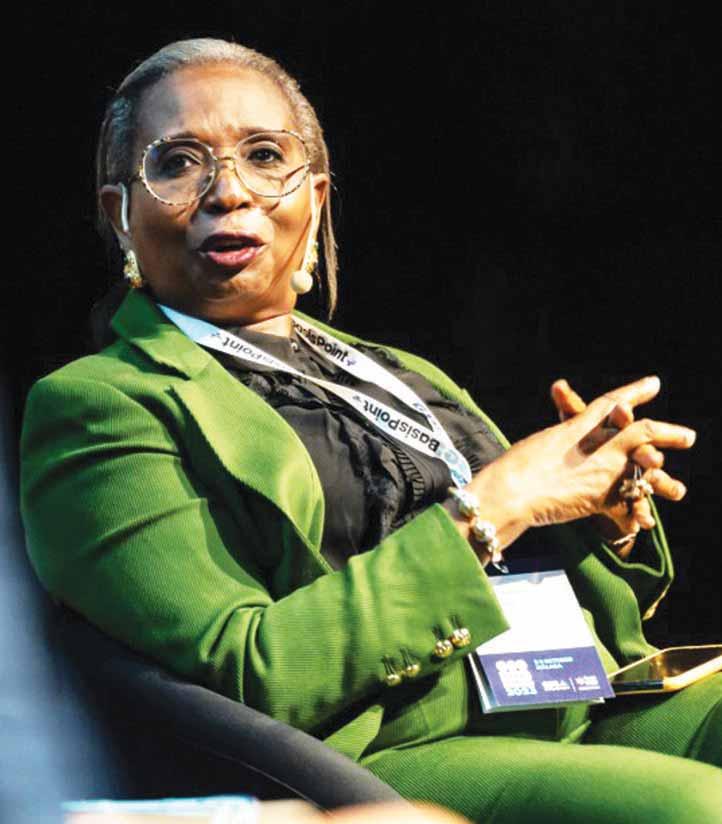
African excellence and redefine the narrative of the ‘Africa story’ through our culturally rich products, innovation and craftmanship. Dubai, being a global hub for trade, culture, and innovation, offered the ideal backdrop for this vision. But more than the location, it’s the heart behind the Marketplace that makes it different. It’s a call to action, a declaration that we are not waiting to be invited to global conversations. We’re building our tables, and we’re inviting the world to come see who we truly are.
Why Dubai? What does the city offer that aligns with your marketplace philosophy?
Dubai is a gateway city, a global crossroads for trade, tourism, and business with unparalleled trade infrastructure and footfall. By choosing Dubai, we are not just exporting our products and services; we are exporting our excellence to one of the world’s most strategic trade stages. The city gives us neutral ground and high visibility, positioning African and Caribbean entrepreneurs to be seen, respected and engaged in powerful ways. We are planting a flag that says: We belong here. We are global players. For far too long, the global narrative around Africa has been one-dimensional, defined by need, rather than by capacity; Aid rather than trade. African Marketplace Dubai 2025 is a deliberate response to that. African Marketplace is a visual declaration that we are creators of value, not just consumers of aid. It’s about giving our entrepreneurs a global voice and market presence. When buyers, investors, and stakeholders see the quality and innovation on display, they will begin to engage with us on new terms of dignity, excellence, and mutual value. That’s the shift we are catalysing. Our businesses are not defined by charity or survival; they are defined by creativity, resilience, and a relentless pursuit of excellence. Through this platform, we are leading with quality. We are placing premium, export-ready products in front of
brings her family, her community, and often an entire ecosystem along with her. My broader vision has always been about unlocking that potential, creating structures where women are not just participating, but leading with confidence and competence. For too long, African women have been boxed into small narratives as traders, side hustlers, and support roles. But the truth is, they are visionaries, builders, and innovators, capable of thriving at the highest levels of global enterprise. African Marketplace was designed with intentional inclusivity at its heart. This platform showcases products and elevates the people behind them. We’ve made a deliberate effort to ensure women-led businesses are not only present but positioned for visibility, connection, and growth. I want African women to see themselves as rightful players in global trade, decision-makers, exporters, job creators. The Marketplace gives them a seat at the table, where their ideas, businesses and brilliance can be seen, heard, and invested in, on a global stage. This inaugural edition in November 2025 will lay a foundation for a second edition in November 2026 as proof of concept, paving the way for our long-term vision of a permanent African Marketplace in Dubai, where authentic and culturally rich African and Caribbean products will be available all year round. Additionally, we will continue to host these exhibitions annually to attract new and innovative brands. The ultimate goal is sustainability, where African and Caribbean businesses thrive consistently in global markets.
From your perspective, what are the biggest systemic barriers young and emerging African entrepreneurs face in scaling globally and how can they be dismantled?
discerning international buyers, not with apology, but with pride. From high-end fashion to cutting-edge tech, from agricultural innovation to cultural artistry, we are telling the full story of who we are and what we bring. The goal is not to impress, but to correct. To shift the lens from aid to trade, from scarcity to abundance, from raw potential to refined performance. This is African excellence delivered without compromise, without dilution and without the need for permission.
Have you formed any key partnerships with governments, trade agencies, or logistics companies in Africa and the Caribbean states for support of this initiative?
Yes, we are currently in conversations with a number of strategic partners, including government bodies, trade agencies, and logistics companies. While these conversations are still ongoing, the feedback and interest thus far, have been very positive. We’re optimistic these partnerships will significantly contribute to the overall success of this initiative. African Marketplace will reconnect continents, generations, cultures and commerce. Africa and the Caribbean have operated in fragmented silos, despite our shared histories and complementary strengths. This platform brings us together not just to trade goods, but to trade wisdom, stories, strategy, and solidarity. Inclusion, for us, is not ticking boxes; it’s creating a new model of prosperity that centers our people and empowers them to lead in the global economy. I see African Marketplace as a seed that will grow into a continent-wide mindset shift. When our entrepreneurs succeed globally, they hire locally. When diaspora communities see themselves reflected in global trade spaces, they invest more intentionally. When African and Caribbean businesses collaborate, we move from isolated progress to collective impact. This is how we build a future where opportunity isn’t limited to geography but is extended by vision, connection, and intentional platforms like AMP.
How does this project tie into your broader vision for African women and business?
At the core of everything I do whether in business, leadership, or advocacy, is a deep conviction that women are powerful agents of transformation. I’ve seen it time and again: when a woman rises, she doesn’t rise alone; she
One of the greatest systemic challenges young and emerging African entrepreneurs face is access—access to capital, access to the right networks, access to mentorship, and critically, access to global markets. Many of these young innovators have the drive, the ideas, and the resilience, but they are often trying to build within fragmented ecosystems that do not fully support their growth. They are navigating regulatory red tape, underdeveloped infrastructure, and limited visibility on the global stage. Even the most brilliant ideas can stall without the right scaffolding to support scale. These barriers are logistical as well as deeply structural. And if we do not address them intentionally, we risk leaving behind a generation of builders whose only limitation isn’t capacity, but opportunity. This is where platforms like the African Marketplace become both enabling and catalytic, taking local, export-ready products and services to global relevance. We are creating a space where young entrepreneurs can connect directly with buyers, investors, and collaborators who would otherwise be out of reach. We are curating a vibrant ecosystem that enables growth beyond borders!
What advice would you give to young African women trying to find their voice in a noisy world?
Be true to yourself and guard your identity. Know who you are in God and build from there. The world will offer many scripts, but your power lies in authenticity. Don’t wait for permission—equip yourself, find your tribe, and rise. Your voice matters, and when you use it with wisdom, it changes everything.
What would you say is your biggest legacy in corporate Nigeria so far?
If I’m remembered for anything, I hope it is for being a door-opener, for showing that excellence, character, and faith are not mutually exclusive in business. Whether it was leading as the first female Chairperson of First Bank or championing inclusion in boardrooms, I hope my legacy is that I made space for others.
Finally, what do you want to be remembered for?
I want to be remembered as a woman who walked with God, served with integrity and built with purpose. A woman who opened doors, tore down barriers and helped others rise. Legacy, to me, is not in monuments—it’s in lives changed. If generations after me can walk taller, dream bigger and believe deeper because of something I did or stood for, then I’ve done my part. My end game in life is to “Die Empty”

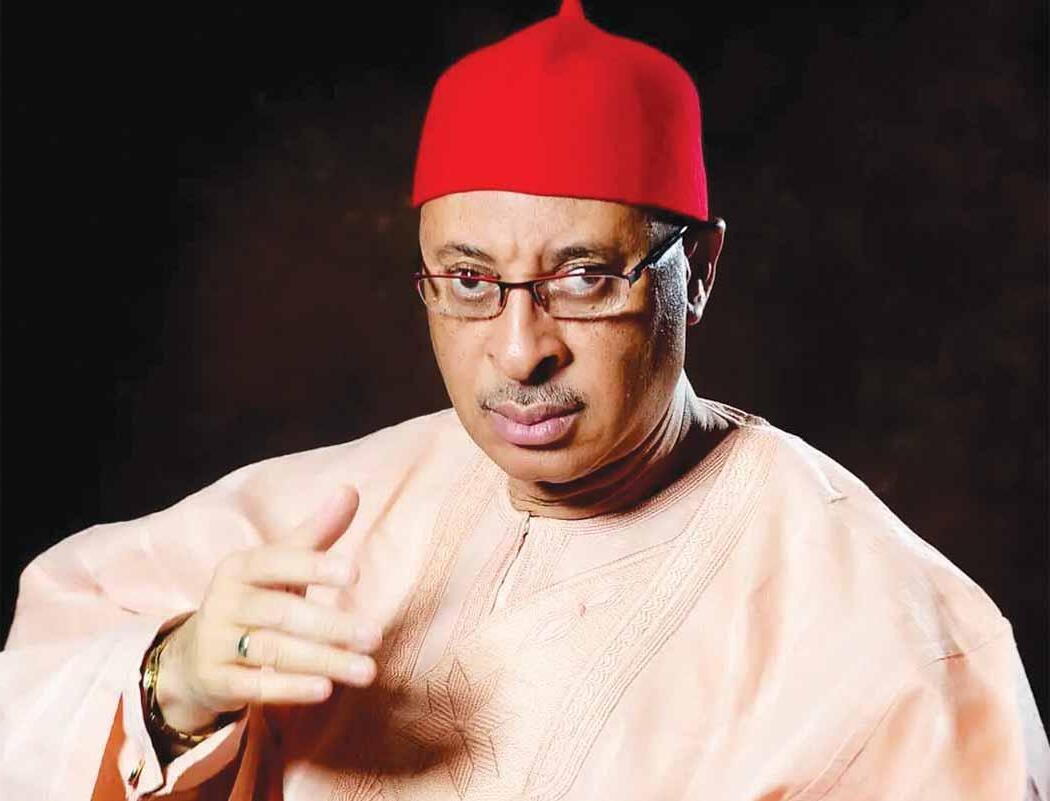



Renowned political economist and public intellectual, Prof. Pat Utomi, reflects on his upbringing, the state of Nigeria with piercing honesty and clarity. He opens up about the formative influences that shaped his work ethics and worldview, his disillusionment with Nigeria’s political elite, and his persistent commitment to systems-driven leadership rooted in creating value over amassing wealth. Sunday Ehigiator brings the excerpts:
Can you share insights into your early life and upbringing?
I had a very pan-Nigerian upbringing, which is why the depth of ethnic divisions in Nigeria today deeply saddens me. I was born in Kaduna on February 6, 1956, the same day Queen Elizabeth II visited. My mother went into labour while trying to catch a glimpse of the Queen, and I was born before she could make it to the hospital. It’s a story I’ve shared with King Charles on two occasions during his visits to Nigeria. I was baptised a few weeks later at St. Teresa’s Catholic Church in Jos. My father, who worked with a British petroleum company, was frequently transferred, so I spent my early years in several northern towns, Maiduguri, Kano, and Gusau, and attended St. Thomas’ Primary School in Kano. Later, I moved to Onitsha for secondary school at Christ the King College (CKC), and when the civil war broke out, I moved to Loyola College in Ibadan. I eventually completed my university education at the University of Nigeria, Nsukka, before heading to the U.S.
for graduate studies. My upbringing was deeply influenced by Catholicism. I was an altar boy at five and a sacristan by eight. I’d ride my bicycle at dawn to Our Lady of Fatima Church in Nguru to prepare for morning Mass, then return home only to be driven back for school. As a youth corp member, I served at New Breed magazine, a transformative experience. At just 21, I wrote articles that sparked national debate and even contributed to a ministerial reshuffle during the Radio Kaduna-NTA integration controversy. That experience gave me early national exposure and a sense of civic duty. Originally, I wanted to be a pilot; it was the dream job back then. Many of my peers, like Mick Mattas, pursued aviation. But my father persuaded me to try university first, “just to mature a bit.” At Nsukka, I discovered the library and eventually volunteered to help run it, which turned me into a voracious reader and changed the course of my life. Instead of flight school, I went straight to graduate school in the U.S., finishing two master’s degrees and a PhD in just four and a half years. The very day I completed NYSC, I boarded a flight to America. And the day I submitted my PhD thesis, I returned to Nigeria, eager
to contribute to national development.
What does a typical day in your life look like, and how significant is spirituality in your daily routine?
My days have followed a fairly predictable rhythm for decades, although I’m now intentionally shifting gears as I prepare for retirement. I typically wake up at 5:00 a.m. and attend Mass by 6:30 a.m., a routine I’ve maintained since childhood. Faith has always been central to my life. It’s not just a belief system; it anchors me and reminds me daily that my actions must align with my values. I believe faith must be active, not just intellectual. After Mass, I usually head straight to my desk, where I’ve worked for over 30 years, and plan my day. Whether it’s academic work at Lagos Business School (LBS), activities with the Centre for Values in Leadership (CVL), or consulting projects, I allocate time accordingly.
If I’m teaching, I go to LBS and return by afternoon for meetings or more desk work, usually wrapping up around 5:30 or 6:00 p.m. Despite numerous invitations to events, I’ve never been a night
person. In earlier years, I might stop briefly at a few evening functions, but I always aimed to be home before 8:00 p.m. Evenings are for family time, dinner, and conversations, after which I retreat to my study until around 1:00 a.m. Faith continues to be a guiding force. During Mass, I reflect on where I’ve fallen short and recommit to living a life of purpose and impact. That reflection fuels my daily actions. I’m often misunderstood by those who measure success by wealth. But I’ve always believed that true wealth lies in the impact one has on others.
A friend, Ben Murray-Bruce, once joked that I hate money because so many people have become wealthy standing on my shoulders, while I still live simply. In response, I wrote a book titled ‘Business Angel as a Missionary’, reflecting on the businesses I helped build and the people I’ve empowered.
Interestingly, living this way has brought unexpected blessings. In recent years, especially when my political stances attracted backlash, friends from across West Africa, whom I’ve known since the days of the West African Enterprise Network, offered me homes in places like Ghana, Freetown, and Banjul, just so I could escape Nigeria’s tensions. Some even go as far as buying my flight tickets when I travel.
So, I can’t help but be grateful. The life of service and impact has not only brought me fulfillment but, in many ways, has also returned material rewards I never sought.
Looking back at your upbringing, who would you say had the greatest influence on you?
There were many. Naturally, my parents played a major role. My father had an intense work ethic; just watching him made it impossible not to value hard work.
That discipline stayed with me throughout life. When I was in graduate school, my thesis advisor once told a colleague of mine, Fulu Ogundimu, that I was a “pathological workaholic and compulsive overachiever”, not as a compliment, but a critique. Still, that mindset helped me complete two master’s degrees and a PhD in just four and a half years. My mother was also incredibly hardworking, but more nurturing. Beyond my family, the Dominican priests at Our Lady of Fatima in Nguru shaped me profoundly. Fathers like Fr. Fama and Fr. Makati, and reverend brothers like Brother Eugene and Brother Louis Mary, were pillars in my early formation.
As I got older, other mentors influenced me deeply: Dr. Christopher Kolade, Dr. Pius Okibo (Nigeria’s first Chief Economic Adviser), and Ukpabi Asika, former Administrator of the old Eastern Region. In my book, ‘To Serve Is To Live,’ I reflect on how their values impacted my own. Academically, I was drawn to the School of Institutional Economics. Scholars like Douglas North and my head of department at Indiana University, Eleanor Lindstrom, had a lasting impact. Lindstrom and I often disagreed during my PhD years, but her brilliance shaped my thinking later on. She eventually became the first woman to win the Nobel Prize in Economics; her plaque now hangs right outside the room where I defended my thesis in 1982. I recently returned to Indiana University and was amazed at how the environment had improved; a stark contrast to many Nigerian institutions that have sadly deteriorated. So yes, my journey has been shaped by many, from my family to religious mentors, professional figures, and world-class academics. Each played a part in shaping who I’ve become.
What was the defining moment that made you venture into politics?
The person who deserves the most credit for nudging me into politics is Papa Ayo Adebanjo. I had the privilege of engaging with many elder statesmen early in life. For some reason, I was always drawn to older, wiser individuals, and they in turn took an interest in me. A classmate once remarked that most of my close friends were at least 30 to 40 years older than I. But I saw these interactions as opportunities to learn. I would ask them a single question and sit back as they essentially dictated a book to me with their responses. I first became an activist as a 17-year-old undergraduate at the University of Nigeria, Nsukka. One defining moment was on my 18th birthday, February 6, 1974. At the time, students across Nigerian universities were protesting in memory of Kunle Adepeju, a
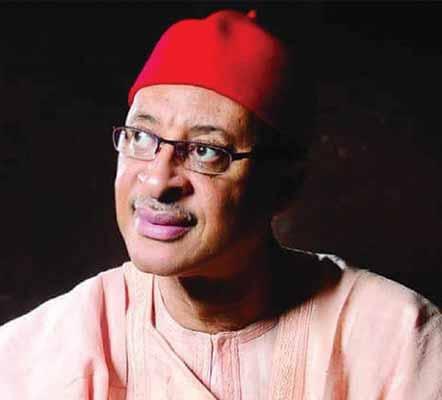
Utomi
student killed by police during a demonstration in Ibadan. Nsukka had remained quiet, as most students were still recovering academically from the Civil War. But a few of us, under the banner of the Student Democratic Society, led by the late Bassey Eyo Bassey, organised a protest. That morning, we marched through campus despite resistance from other students. During a rally later that day, a well-known student activist, Chaman Pinnick, gave a rousing speech, declaring that the post-war student body had finally become mentally demobilised. As the crowd erupted in applause, I suddenly remembered, it was my birthday. I had been so consumed by the movement; I forgot I had turned 18 that day. My activism continued well beyond my university days. During the “Ali Must Go” protests against Education Minister Dr. Ali, I had already graduated and was serving as a youth corps member. My apartment in Barikisu Iyede Street, Lagos, became the organising point for the National Union of Nigerian Students. From there, we coordinated meetings and even consulted with the late Gani Fawehinmi, whose chambers were nearby. Gani became very fond of me, and my involvement in national student activism deepened.
Years later, Papa Adebanjo told me, “Activists alone don’t change nations. They raise awareness, yes, but real change requires political engagement. You must enter politics.” That was the turning point. His words planted the seed. It wasn’t immediate, but the conviction grew over time, and eventually, I made the leap from activism to active politics.
You later contested to be President of Nigeria. What was the experience like for you, and what were your lessons?
Running for president in 2007 was one of the most intense and defining experiences of my life. Unlike many candidates who get on the ballot just to make a statement, I ran a full campaign, visiting all 36 states of the federation despite having no major financial backers. A few close friends offered their cars, and we travelled largely by road, often in challenging conditions. It was grueling, but it also reaffirmed my deep commitment to Nigeria. One moment that has stayed with me occurred in Gombe, during a courtesy visit to the Emir. I expected the usual formalities and polite words, but what I received was an emotional and unexpected endorsement. He said, “I want to thank you for your decision to run for president. I’m not saying you won’t win, but if by any chance you don’t, please don’t give up. Because until someone like you becomes president, Nigeria will not make progress.” It was both humbling and sobering. He went on to describe how the wrong people often rise to power and surround themselves with technocrats whose advice they routinely ignore. That encounter left a lasting
impression on me. At another stop in Adamawa, then-Governor Boni Haruna, a PDP member, lent us SUVs from his official fleet after seeing our struggling vehicles. That act of generosity, across party lines, reflected the Nigeria we once had, where decency and respect for opposing views were still possible. Despite the warm reception in many places, the 2007 election was far from free or fair. The level of manipulation and rigging was overwhelming. Even Umaru Yar’Adua, who emerged as president, openly acknowledged the flaws in the electoral process. It was disheartening. I had hoped our campaign could at least shift the conversation and lay the groundwork for credible, issues-based politics. Instead, I was faced with a system that had no intention of reforming itself.
After the election, Chief Anthony Enahoro reached out to me, urging me to help form a new progressive political movement. But I was deeply discouraged. I had just come through a traumatic political experience, and I felt like I was being punished for trying to do what was right. It’s not widely known how much people like me have suffered; economically, socially, and professionally, because of our principled political stances.
Businesses linked to us are often targeted. We face blacklisting and silent persecution. But we endure in silence, hoping the country will someday understand the price of integrity. Today, we see Peter Obi facing similar challenges, being warned not to enter certain states, having his businesses undermined, and being barred from speaking at universities at the last minute. I’ve experienced those things too.
They rarely make the news, but they are part of the hidden cost of challenging the status quo in Nigeria. The biggest lesson I took from 2007 is that Nigeria, unfortunately, is not a true democracy. What we have is a captured state, where power is hoarded and manipulated, and even the institutions meant to safeguard democracy, like the judiciary and the legislature, are compromised. It’s a dangerous place for a country to be, especially when the political class has become dependent on state resources rather than generating real economic value.
That realisation made me pivot. I decided that, rather than continue in a broken political system, I would focus on what I could do through education, thought leadership, and entrepreneurship. At Lagos Business School, I championed the need to shift attention from corporate managers to entrepreneurs who could drive job creation and economic growth. My advocacy led to the founding of the Enterprise Development Centre (EDC), and I taught the first courses in entrepreneurship there for about a decade. But I didn’t stop at teaching. I actively supported many of my students, standing as guarantor for loans, investing in startups, and sitting on their
boards. Some succeeded; a few failed. One former student defaulted on a loan of N11 million, and because of that, I haven’t been able to operate a Nigerian bank account this year. I couldn’t even buy petrol recently because none of my cards worked. That’s the price I’ve paid, putting my money and reputation where my mouth is. Yet, despite the frustrations, I remain grateful. I’ve learned, I’ve contributed, and I’ve stayed true to my values. Whether through politics, education, or enterprise development, my aim has always been the same: to help Nigeria rise above its challenges and live up to its potential.
Let’s talk a bit about political economy. As a political economist yourself, how do you make sense of Nigeria’s political-economic contradictions today?
It’s deeply distressing. Afriend of mine, James Robinson, co-author of ‘Why Nations Fail’ and a recent Nobel laureate, said in a CNN interview that most countries now know what to do to develop, but some, like Nigeria, simply don’t do it. That hit home. Our problem isn’t a lack of knowledge; it’s the selfishness of the political class. They know what needs to be done, but refuse to act. As we speak, 75 per cent of rural Nigerians live in chronic poverty. That’s not just an economic failure; it’s a ticking time bomb for social unrest. In 1960, rural Nigerians were better off. They exported cocoa, palm oil, groundnuts and saved money. Today, they are barely surviving. The system has failed them. The banks that once relied on rural savings now have nothing to draw from. We’ve turned producers into beggars.
Other countries like Vietnam have shown what’s possible: land reforms, agricultural support, and value chain development. Nigeria could be earning far more from agriculture than from crude oil. But our leaders are too self-absorbed to do what’s right.
Is that what inspired your idea of a‘shadow government’?
Exactly! For democracy to work, there must be people outside power who are still thinking and proposing solutions. That’s what I hoped to build: a credible, intellectual and policy-driven alternative that could critique government decisions constructively. In fact, in 2008, President Umaru Musa Yar’Adua invited me to join his cabinet. I told him I had just formed a policy team that would monitor and advise from the outside, a shadow government of sorts. We argued for two hours at the Villa about whether one can make more impact from within or outside the system.
I told him I would offer advice anytime, day or night, free of charge. But he insisted that being inside would allow me to do more. He asked me to help him identify seven good people for key ministries and add myself as the eighth. Eventually, I agreed. I returned to Lagos, assembled a list of names, and sent it through the then-Secretary to the Government, Steve Oronsaye. I never heard back. Yar’Adua died not long after. Years later, someone in his inner circle told me he probably never even saw the list. It might have been intercepted.
And regarding the matter with the DSS? We’re in court. It’s a broader issue of civil liberties and the right to speak truth to power. We’ll see it through.
What exactly do you mean by a shadow government, especially in light of this new coalition?
I’m hoping we all recognise that this must be bigger than individual ambition. It can’t be about “me, myself, and I.” It has to be about Nigeria, about systems, about institutions, not personalities. Otherwise, we’ll keep repeating the same cycle.
Leadership must be collegial, not centralised around one figure. When we place our hopes in a single person —“Oh, Buhari will save us,” or “Oh, Tinubu will fix everything”, we’re doomed the moment they take a wrong turn. Collective leadership creates checks, balances, and resilience. I’ve made these points repeatedly during meetings with members of the coalition. Political parties have been part of Nigeria’s problem. So if we must have one, it must be ideologically grounded.
Obinna Chima
The Chairman of the BUA Group, Abdulsamad Rabiu, who turns 65 on Monday, stands as one of Africa’s most accomplished and quietly impactful industrialists. Rabiu, through his chains of businesses, has not only shaped industries but also helped shape lives.
As the continent continues to search for visionary leaders who blend business acumen with social consciousness, Rabiu’s trajectory offers a compelling portrait of what enterprise, empathy, and excellence can look like when harmoniously combined.
Rabiu, who has not hidden his admiration for President Bola Tinubu, strongly believes the president’s reforms have put the country on the global economic map.
In a recent article he penned, he wrote, “In making that shift, Nigeria is taking the lead for a continent to follow. So many Nigerian administrations I have known have been hostage to economic events, doubling down time and again on state intervention rather than having the conviction to reform.
“This administration is proving different. After two years of difficult reforms, Nigeria – under President Bola Tinubu – is now poised to fulfil the promise of its vast natural resources, rapidly growing population of over 200 million people, and strategic coastal location along the Gulf of Guinea.” Born on August 4, 1960, in Kano State, to a prominent businessman and Islamic scholar, Isyaku Rabiu, he received his early education in Nigeria. The Chairman of BUA Group attended the Federal Government College, Kano, after which he proceeded to the United States to study Economics at Capital University, Columbus, Ohio, United States of America. Thereafter, he returned to Nigeria and joined the family business, the IRS Group, until 1988, when he set up BUA Group.
As someone who was born into a family of influence, Rabiu could have rested on inherited privilege. Instead, he forged a path marked by grit, discipline, and an unrelenting commitment to adding value — not only for shareholders, but also for Nigeria’s real economy.
From cement to sugar, rice, steel to real estate, flour milling, oil and gas, among others, Rabiu has built BUA Group into one of Africa’s most respected conglomerates, serving millions, creating thousands of jobs, and strengthening the backbone of Nigeria’s manufacturing sector.
In an era where industrialisation remains critical to Africa’s economic sovereignty, his investments speak louder than promises.
Yet, what makes Rabiu truly stand out is not just the billions he has made or the industries he has transformed. It is the quiet dignity with which he leads. In an age where flamboyance is often mistaken for success, Rabiu remains a study in understated brilliance — a man who allows his work to speak for him, his factories to echo his ideals, and his philanthropy to express his values.
His companies listed on the Nigerian Exchange Group (NGX) – BUA Foods and BUA Cement - have continued to post positive earnings, delivering superior returns to investors, a testament to his strategic foresight, disciplined execution, and commitment to value creation. This consistent performance
has not only boosted shareholder confidence but also reinforced the credibility of indigenous conglomerates in Nigeria’s capital market, positioning his enterprises as models of resilience and growth in a challenging economic environment.
For instance, BUA Foods Plc recently posted a 101 percent year-on-year growth in profit before tax, reaching N276.1 billion as of the half-year ended June 30, 2025. According to the company’s unaudited financial results filed with the NGX, revenue rose by 36 percent to N912.5 billion, driven by strong performance across its sugar, flour, pasta, and rice segments. Also, its rice division saw a remarkable 2923 percent surge in revenue, growing from N1.3 billion in the first half of 2024 to N39.3 billion in the same period this year. Similarly, gross profit increased by 55 percent to N339.3 billion, with gross margin rising to 37.2 percent from 32.4 percent the previous year.
Similarly, BUA Cement posted a 43 per cent year-on-year increase in revenue to N289.5 billion in the second quarter of 2025. Its cost of sales rose to N142.2 billion from N138.6 billion in the second quarter of 2024. Also, its gross profit more than doubled to N147.3 billion, and the company’s gross margin improved to 51 per cent from 32 per cent in the second quarter of 2024, just as its net profit rose five-fold to N99.77 billion in the second quarter 2025, from N16.28 billion in the 2Q25.
Rabiu, through his various business interests, has also been a champion of protecting the environment through his investments in manufacturing plants that meet or exceed stringent environmental standards, with a focus on recycling most of their waste products, the use of cleaner energy sources like natural gas, whilst reducing the environmental impact of their operations.
As a testimony to his hard work, indefatigable entrepreneurial spirit, and consistently championing Nigeria as a preferred investment destination in Africa, Rabiu was reappointed by President Emmanuel Macron of France as the President of the France-Nigeria Business Council in 2022. A recipient of many awards, including THISDAY’s ‘Titan of the Year,’ in 2025, Rabiu’s net worth, according to Forbes, has increased to $6 billion as of July 28, 2025, owing to the success of BUA Foods and BUA Cement. His wealth has seen a $900 million gain since the beginning of the year.
Through the Abdulsamad Rabiu Initiative for Africa (ASR Africa), he has committed hundreds of millions of dollars to health, education, and social development — giving not for applause, but from a genuine desire to close opportunity gaps across the continent. The ASR Africa was established in 2021 to provide sustainable, impactbased, homegrown solutions to developmental issues affecting health, education and social development within Africa.
Just this week, the ASR Africa, through its Tertiary Education Grant Scheme (TEGs), donated a state-of-theart administrative block worth N250 million to AlQalam University in Katsina State. Built and equipped with cutting-edge equipment by ASR Africa, the administrative structure was donated to the College of Allied Health Sciences of the university on Thursday.
The administrative block, which was proposed by the
Allison Abanum
Ared ball is unmistakable amongst a stack of white balls. Such theory is universally accepted because of its validity. Its inherent characteristics are a major tool for distinction. From one generation to the other, humanity is graced with the presence of personalities worthy of citing as analogous or parallels to the distinct red ball amidst white ones. Some people stand out amongst a vast majority in character, knowledge and competence. Step forward Chief James Onanefe Ibori, Governor of Delta State (1999-2007).
In every generation, a few leaders are distinguished because they governed not by coercion but by the sheer force of their charisma and adherence to principle. In Nigeria’s return to democratic governance, Chief Ibori stands out as a leader who wielded power with one of the rarest of virtues - restraint. He did not lead as a conqueror. He governed through service. Ibori’s tenure as Governor of Delta State was defined by humility, civility, and unwavering respect for democratic order. At a time when political office was fast becoming a spectacle of dominance and a tool for vengeance, he chose dignity over drama, cooperation over
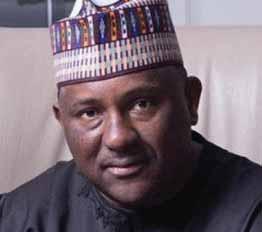
management of the institution to support the establishment of the college, has lecture theaters, classrooms, 18 offices for academic and administrative staff, as well as a conference hall.
Also, the ASR Africa recently held the fourth edition of its three-month mentorship program at Babcock University, Ogun State, with female mentees, who are students of the school, drawn from different fields of study. Launched in May 2025, the mentorship program at Babcock University was delivered as a structured initiative designed to equip female students, particularly those approaching graduation, as they prepare for life beyond the University. Tertiary institutions that had benefitted from this mentorship programme include Federal College of Education (Technical) in Gusau, Al-Qalam University in Katsina State, and the University of Zambia (UNZA) on the continental stage. Beside the mentorship programme, several universities across Nigeria and Africa have benefited from Rabiu’s philanthropic initiative. Some of them include the flagging off of construction of a N250 million Abdul Samad Rabiu Laboratory Complex at the University of Lagos; the Abdul Samad Rabiu Center for Corrosion Research at the Federal University of Petroleum Resources (FUPRE), Effurun, Delta State; conducted business management training and support grant awarded to 100 widows; ongoing construction of an ultra-modern Student Affairs Center at the Nnamdi Azikiwe University, Anambra State; ongoing construction of a N280 million Abdul Samad Rabiu Integrated Publishing House for Babcock University; among several others.
Rabiu’s 65th birthday offers more than a chance to celebrate personal milestones. It is an occasion to reflect on his type of leadership: vision without vanity, wealth with wisdom, and success without arrogance.
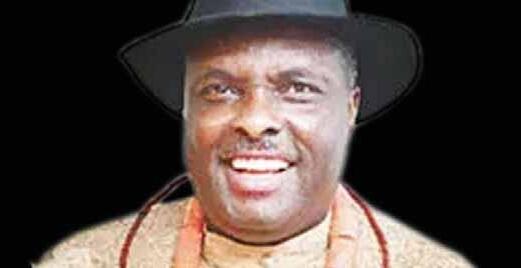
confrontation, and unity over ethnic bigotry.
Ibori was modest, spoke with courtesy, and governed without arrogance. As a Governor, he did not parade his authority. He did not demonize opposition voices. And even when betrayed politically, he responded with grace, not grudge.
In a nation where politics often spills into aggression and cults of personality, James Ibori remained measured, sober, and consistently
democratic. His administration faced real challenges—economic pressures, party rivalries, and inter-ethnic tensions—but he resisted the temptation to abuse power in response. He strengthened institutions rather than personalize them.
He allowed dissent without treating it as disloyalty. He respected the diversity in the State character and ensured that every ethnic group in the State received a fair share of the
State infrastructure development program. He prioritised harmony while remaining firm on matters of principle and never turned governance into a battlefield of vendettas. What cements Ibori’s legacy is how he left office finishing strong and working as a statesman thereafter. He remained accessible, is deeply respected and loved and is spiritually grounded till date. His home was never turned into a shrine of power, yet it remains a quiet reference point of leadership done right. His name is not invoked in aggression, but in admiration. His memory endures—not because of propaganda, but because of principle.
Ibori’s legacy teaches us that the most enduring form of leadership is not forged through fear or media machinery but that it is built through character, consistency, and conscientious leadership. He demonstrated that a true leader can be gentle without being weak, firm without being brutal, and revered without being theatrical.
In today’s age of political noise and combative governance, Nigeria desperately needs to relearn the lessons of the Chief James Ibori leadership tradition. His era may be gone, but his style remains a blueprint—quiet, honest, inclusive, and sincerely patriotic. When we speak of national healing, of unity, and of reclaiming trust in public office, we are, knowingly or not, invoking the memory of leaders like Ibori.
As we celebrate Chief James Ibori Sixty Seventh birthday, may his ideals continue to echo in the hearts of the people and may his life and leadership continue to be a guiding light for all.
Allison Abanum writes from Abuja.
E said the salvation of the country cannot (could not) be found in any of the existing political parties.”
“7 LGAs violentprone (violence-prone) in Bayelsa elections—NGO”
“Pa Ukoha was a selfless community leader, (otiose comma) who committed his personal resources to the upliftment (uplift) of Igbere community.”
“Mbah handsover (hands over) 65 security vehicles to police”
“Here are the personalities that grace (graced) the occasion.”
“Two of England’s most successful clubs will on tomorrow (delete ‘on’) go head-to-head in the Premier League as Manchester United take on Liverpool.”
“Incessant fuel tanker fire (fires) worries (worry) Obi of Onitsha
“…so that our people will live a prosperous, safe and secure lives (life) in their environment (environments)….”
“…as cost of raw materials skyrocket (skyrockets)”
“RUGA: Why farmers, herders (herders’) crisis (crises) persist—Don”
“The ban on tinted glasses is even more reprehensible because the security benefits it can deliver is (are) far from certain.”
“Gov, Reps demand his arrest over (for) inciting comments on 2023”
“A week’s trail on the heels of pirates reveal (reveals) how Nigerians lose billions of Naira to the kingpin….”
“Court remands Edo lawmaker in prison over unlawful possession of firearm” The lawmaker was remanded in custody—not in prison!
“That is why the Presidency must show more leadership and tact before jumping into a battle just because it thinks it has the power to crush the enemy—real or imagined.” Get it right: the enemy—real or imaginary.
“Nigerian scientists have failed woefully.”
THE SUNDAY INTERVIEW: …have failed abysmally (not woefully)
“Let me also make this point that our scientists have not done creditably well over the years.” No overkill: either creditably or well.
“Insurgents await ransom, assure on ex-minister’s safety” ‘Assure’ is a transitive verb. It must take an object.
“Restoring sanity on (to) the road should be the first tangible step if he is serious about….”
“The result was that what was supposed to be a consensus agreement willingly entered into by….” ‘Consensus agreement’? Next time, just choose one.
“It was flurry of activities in Abuja last week.…” A flurry or a hive of activity….
“The minister said government’s desire to licence (sic) a second carrier is (was) born out of the…” General view: borne out.
“Knowing fully well that Abacha was a key factor in the Babangida regime.…” Intelligent commentary: knowing full well.
“Some blind beggars on a street in Lagos Island” Beggars in a street on (not in) Lagos Island.
“…Catholic cardinals who converged at (on) the Vatican for a three-day meeting….”
“Manhunt begins for killers of award winning (award-winning) police chief.”
“…writes (writes to) the president to intimate him of (to) the hardship ravaging the land.”
“The civil servants have got pay rise, yet their purchasing power have (has) been decimated.”
“The ITSC equipment was damaged early this week by a heavy rainstorm....” In the interest of telecoms, delete ‘heavy’-–which is contextually otiose, just like ‘heavy downpour’!
“Every moneybag (moneybags) wants you to know when he is celebrating….” ‘Moneybag’ is the sac used in putting money, while the owner is a moneybags.
“A professional must update his knowledge in his chosen career otherwise he becomes a mediocre.” The way we write: otherwise
Football, in all its poetic, tribal, and sometimes tragic drama, has long served as Nigeria’s most potent unifier. In a land of splintered identities - ethnic cocoons, political bunkers, and religious silos - football arrives like a public holiday nobody argues about. It doesn’t require fuel, or electricity, or permits. You don’t need to understand VAR to understand joy. Just one goal, one audacious dribble, and suddenly, neighbours who hadn’t spoken since the last election are hugging like long-lost cousins.
Of course, this relationship is complicated. The national male team, the Super Eagles, have often flirted with greatness but are far more consistent at delivering high-blood-pressure therapy. From the sweet triumphs of the 1973 African Games gold, to the glories of the 1980, 1994 and 2013 AFCON wins, and those eye-catching Olympic medal runs - yes, we’ve had moments. But we’ve also perfected the art of snatching defeat from the jaws of victory. With them, hope is like a rented apartment: occasionally comfortable, rarely permanent.
Now shift your gaze, if you will, to our women’s national team - the Super Falcons. While the nation alternates between romance and regret with the Eagles, the Falcons have quietly built a dynasty. Ten-time winners of the Women’s Africa Cup of Nations. Ten! That’s not a fluke or a lucky streak. That’s dominance carved in granite. And yet, they’ve often had to celebrate in the shadows, with muted drums and half-hearted handshakes from the powers that be. Until now.
This year’s campaign - the 13th edition of the tournament, staged in Morocco - was initially greeted with the usual Nigerian shrug. With a collapsing economy, a currency on life support, and inflation that needs an exorcist, many simply couldn’t spare the bandwidth to care. But then came the fireworks. In the group stage, most Nigerians barely noticed the scores. But once the Falcons
he becomes a mediocrity or mediocrist. ‘Mediocre’ is an adjective that cannot function as a noun except in a collective manner (the mediocre).
“The emergence of vigilante (vigilance) groups to combat the activities of men of the underworld is only symptomatic of lack of faith in the ability of the police to guarantee….”
“The assurance from the IGP is therefore supposed to act as a soothing balm.” Is a balm not supposed to soothe? Does it do the opposite?
“…it will be much more so with one involving a police personnel.” ‘Personnel’ is a collective term. Use ‘policeman’, ‘officer’ or ‘cop’.
“But how do we prevent hunger in 2027 when politicians will engage themselves (one another) in a do or die (do-or-die) battle for re-election.”
“VP condemns do or die politics” This way: do-or-die politics.
“The race to Government House in Kano has began in earnest as….” Without any effort: The race has begun….
“…those who would have uttered (what?) them reduced everyone to spectators while they reached for each other’s throats.” Get it right: each other’s throat or one another’s throat (depending on context).
“Knowing what to wear and how to compliment (complement) it goes a long way….”
“The state, therefore, does not deserve the treatment being currently meted to it”. Classical expression: being meted out to it.
“Chief of Naval Staff advocates for increased productivity via industrialization” When used as a verb, ‘advocate’ does not admit ‘for’. Let us avoid verbiage in headline casting: Naval Chief advocates increased productivity.
“For the university to recommend that students should pay for the damages while they have….” A common mistake: except in legalese, ‘damage’ cannot be pluralized.
walloped pre-tournament favourites Zambia 5–0 in the quarterfinals, the murmur began. Eyes widened, data was bought, Twitter (X) came alive. And when the team knocked out defending champions South Africa with a spirited 2–1 in the semis, the nation’s pulse aligned. Suddenly, “Mission X” was trending - not as a secret plan in a spy movie, but the audacious dream of our women to secure a record-extending 10th continental title.
By the time Saturday, 12th June dawned, Nigerians were emotionally invested. Some, perhaps more than the Moroccan hosts, whose federation had spared no expense - hosting the tournament for the second consecutive season, rallying fans like a national election, and positioning themselves as inevitable winners, by all means… including chasing our girls with laser lights on their faces to distract them.
The final did not disappoint. In true Nigerian fashion, the girls went two goals down in the first half. Cue collective eye-rolling, curses, tactical analyses from beer parlours to WhatsApp groups. “Dem don start again.” “No plan B.” “Coach dey sleep?”
But this team wasn’t scripted for pity. They came out of the tunnel with fire in their veins. With grit, grace and sheer gumption, they clawed back to win 3–2 - snatching the title from Morocco’s manicured grip. The entire nation erupted in digital ovation. The same voices that had lambasted their “shambolic first half” were now composing odes. Memes of epic comebacks flooded the internet. Even the gods of inconsistency bowed in respect.
Yet, beyond the glitz of the final score was something deeper. This victory arrived like an unsolicited miracle in a country wheezing under the weight of economic, security and leadership fatigue. In the face of hyperinflation, rising food insecurity, and an unrelenting dollar exchange rate that renders monthly salaries as pocket change, the Super Falcons gave Nigerians something rare: collective joy. Not just in the “we won” sense - but in the way that only national pride, properly earned, can soothe

“…rather than investigating and finding out who were involved and check against future re-occurrence: Beyond recurrence, can an event yet to take place happen in the past?
“…the university is pointing its accusing fingers in the direction of the lecturers.” True idiom: point a/the finger. No inclusion of ‘accusing’ or inflection of ‘finger’.
“It is our belief that we members of the alumni association of our Alma Mata (Alma Mater) have unique roles to play in the restoration of sanity on our university campus.” It is… restoration of sanity to (not on) our campus.
“Isn’t it funny that it is the beak with which a bird builds it’s (sic) nest that it uses to scatter it.” Possessive: its
“…the AU summiteers concentrated almost exclusive (sic) on the political independence and liberation of countries in (on) the continent.”
“Monday’s action, which started at dawn, was as a result of the breakdown of series of negotiations…” An agendum: a series of negotiations.
“According to investigations, the deceased was said to be resting alone in his room at about 9.p.m….” Every reporter should be decisive based on timing which description to use: either at or about 9 p.m. The two cannot co-function.
“According to the source, the institution has a very high percentage of failure in the last academic year.” Reported speech: the institution had (not has).
“… that the authorities of the institution was (were) still waiting the result of the police analysis of the bomb”.
“…in the next three years, its per capital income would have ...” This way: per capita income.
“Then it was catalogue of misses for the Super Eagles.” In the spirit of qualification: a catalogue of misses.
the battered soul of a people.
Of course, this is Nigeria. Once the confetti falls, the opportunists come crawling out like termites at dusk. The federal government, true to type, didn’t wait for the sweat to dry. There were camera flashes, choreographed smiles, and a cacophony of accolades. Then came the announcements: each of the 24 players would receive naira equivalent of $100,000 (and $50,000 for each of the 11 officials), totalling around $3 million (approx ₦4.5b); national honours were conferred - Order of the Niger (OON); three-bedroom apartments promised at a Renewed Hope Estate. It was as if they had just returned from the moon, not a football tournament.
We clapped, yes. Because these women earned it - every kobo. But as the drums rolled, a few sober voices raised questions. Was this sudden largesse sustainable? Was it morally sound to dispense millions of dollars in reward at a time when ASUU and health workers’ strikes linger like chronic ailments, and school children write exams under leaking roofs and flickering ‘torchlights’? Would the promises be fulfilled - or end up as just another bullet point in Nigeria’s pantheon of political unkept pledges?
Ask the heroes of 1980 and 1994. Many are still waiting for their “promised lands.” Some have died waiting, their plaques gathering dust in homes built from hope deferred. That’s the thing about our system: we celebrate the moment with clinking glasses, but we fail to build institutions that remember, reward and replicate excellence.
To their credit, private citizens also rose. A group of ex-internationals raised ₦30 million in solidarity. State governors, ever alert for media moments, isolated their “daughters” in the squad and showered them with gifts. The amorphous Nigerian Governors’ Forum chipped in ₦10m for each player. The wave of gratitude was nationwide - until someone reminded us about the match bonuses and camp allowances that were almost withheld

fajalive1@gmail.com 08033622806- (SMS Only)
before public outrage forced the NFF’s hand. The same NFF that now walks with puffed chests as if they laced the boots or scored the goals.
Let’s be honest: we need a new approach to rewarding excellence. Not everything should end in bundles of cash or shiny medals. What about investing in grassroots female football? What about modern training facilities in every zone, scholarships for young girls from under-served communities, or endowments for retired players to transition into coaching or management?
The Falcons’ 10th triumph should be more than a parade and pay day. It should be a foundation stone. Let’s immortalise their names beyond Twitter trends and YouTube highlights. Build sports academies in their honour. Fund their post-career growth. Ensure the next generation knows that Nigerian excellence is not only momentary - but measurable, memorialised and magnified. Because the sad truth is: the cash will run out. The apartments will need maintenance. The medals will tarnish. But what will endure is the system we build - or fail to build - around this achievement. If we reduce this glory to a weekend carnival and photo ops at the villa, we have once again fed the moment while starving the movement.
In a country where dreams are often lost in bureaucracy and brilliance is muted by mediocrity, the Super Falcons have reminded us - again - that Nigeria works, if you let talent lead. They didn’t wait for perfect funding. They didn’t play for headlines. They played for pride, for legacy, for country.
Now it’s our turn to ensure their story doesn’t end at the final whistle.
President Bola Ahmed Tinubu on Thursday, approved a one-year extension for the ComptrollerGeneral of the Nigeria Customs Service (NCS), Mr. Bashir Adewale Adeniyi. His tenure was originally due to expire on August 31, 2025.
Adeniyi was appointed in 2023 and has since led several transformational initiatives aimed at repositioning the Service for greater efficiency, transparency, and alignment with global trade standards.
In a statement, the Special Adviser to the President on Information and Strategy, Mr. Bayo Onanuga, said the extension would enable Adeniyi to consolidate ongoing reforms and complete strategic initiatives under the administration’s Renewed Hope Agenda.
Among the critical projects highlighted are: the continued modernisation of the Nigeria Customs Service, the full rollout of the National Single Window Project, and the effective implementation of Nigeria’s commitments under the African Continental Free Trade Area (AfCFTA) protocol.
“The extension, approved by President Bola Ahmed Tinubu, will enable Mr. Adeniyi to consolidate ongoing reforms and complete critical initiatives of this administration,” the statement said.
Tinubu also acknowledged Adeniyi’s “steadfast leadership and commitment to service” and expressed confidence that the additional year will further strengthen the Nigeria Customs Service in its core mandate areas—trade facilitation, revenue generation, and border security.
Clearly, Adeniyi’s tenure extension is a clear vote of confidence in his leadership and reform-driven agenda.
The Nigeria Customs Service plays a vital role in the country’s economic framework, serving as a gatekeeper for revenue collection and national security at the borders.
With the AfCFTA now entering critical stages of execution, the administration’s decision signals a continued emphasis on trade integration, digital systems enhancement, and cross-border efficiency.
Since assuming office, Adeniyi has spear-
headed a wave of institutional transformation, blending professionalism with innovation to modernise Customs operations and reposition the agency as a critical enabler of economic growth.
His reappointment signals a strong endorsement from the presidency and a recognition of the urgent need to sustain the momentum of change he has inspired within the Service.
Under Adeniyi’s watch, the NCS has witnessed significant improvements in trade facilitation, revenue generation, and border security. His emphasis on digitisation, transparency, and compliance has helped close loopholes, enhance efficiency, and boost stakeholder confidence in the agency’s processes.
According to stakeholders, one of the factors that led to his tenure extension was that last month, the World Customs Organisation (WCO), comprising the Heads of 186 Customs administrations, formally endorsed Adeniyi as its Chairperson.
In his acceptance speech, Adeniyi acknowledged the exceptional work of his predecessor, whose guidance and stability he said provided strong leadership for the Council.
“Specifically, I hope to build on the progress made so far in the development of the Strategic Plan for 2025-2028 and I look forward to working with the Secretariat and the Vice-Chairs towards its diligent implementation and WCO modernization,” he added.
The Customs CG also pledged his commitment to ensuring that the recently launched B’Odogwu system is transformed into a first-class trade facilitation platform for the country.
Adeniyi said with all the clarity of the system, they are now resolute to transform the platform into a world class trade facilitation platform for trade modernisation.
According to him, “Technology is not cheap. As we migrate from one system to the other, we make a lot of investments in technology rollouts. We are going to be talking about scanners, system upgrades, and all of that. And our plan is to make B’Odogwu a reference point in trade facilitation.
“Now that the chairmanship of the WCO is with us, we also want to show the world that we can take in our trade, manage it by a system that is indigenously developed. So at
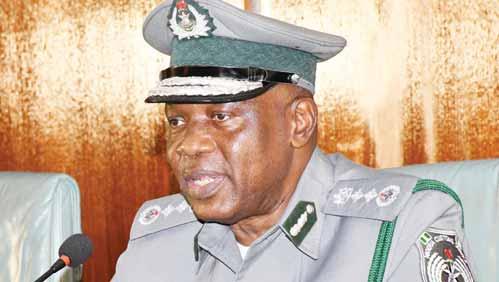
the end, in the next three years, it is going to be Oduku to the world, and Nigerians will see that we have a system that can work. However, technology everywhere is capital intensive.”
B’Odogwu is a locally developed digital trade facilitation and integration system introduced by the Nigeria Customs Service. The Comptroller General has also within a short period of time, through the instrumentality of synergy, substantially cleared several of the illegal checkpoints on the Lagos-Abidjan trade corridor, which had before now, constituted a serious hindrance to the free flow of legitimate trade. The Customs management is currently optimising implementation of the Nigeria Customs Service Trade Modernisation Project TMP, which is aimed at further promoting trade facilitation. When fully operational, the project would enhance a unified Customs management system, trade portal, and cargo release system. These come alongside other automation services such as big data and artificial intelligence AI, integration and document management system, as well as transition and handbook, which covers technology upgrades and enhanced capacity building. The project, which has received
a major boost in the last eight months, has severally been identified as a milestone, as it highlights the significance of digitisation for transparency, efficiency, and effectiveness of port operations.
From the automation of clearance procedures to his commitment to capacity-building across the Service, Adeniyi has consistently demonstrated that meaningful reform is both possible and necessary within Nigeria’s public institutions.
What also stands out in Adeniyi’s tenure is his people-centred leadership style. His open-door policy and hands-on engagement with personnel and external stakeholders alike have created a more responsive, performance-driven culture across Customs commands.
At the heart of his reforms is a belief that the Service must not only generate revenue but also contribute meaningfully to national development by easing the cost of doing business and protecting local industries from illicit trade.
As he begins another year at the helm, expectations are high. But so too is the optimism that Adeniyi will consolidate the gains of the past year and deepen the reform path.
Kenneth Ezra
The newsroom is the factory for the production of news stories. But within the newsroom itself, many news stories have not been written and may never be written. That is why I take the liberty to define the Press as a group of people who write about everything under the sun but very little about themselves. One of those unwritten stories is perhaps this one you are reading about me and one of my former bosses while I worked as a Staff Reporter on The Guardian On Sunday. He is a man I regard as one of my mentors, and his name is Alhaji Raheem Adedoyin.
It is said that every person is a product of his past and, all things considered, I cannot easily forget The Guardian On Sunday where I cut my reportorial teeth and honed the skills that carried me over the years. I think I was lucky to have been recruited by The Guardian Newspapers and even luckier to serve on The Guardian on Sunday widely acclaimed then and perhaps even now as the crown jewel of the flagship of the Nigerian press. And that is judging from the exclusivity, variety and flair of our weekly menus. Our title was a revolving, weekly intellectual workshop. Once you were on The Guardian On Sunday, you appear to have limitless access to the inner sanctum of
news reporting. At that time in the early 1990s, The Guardian On Sunday was led by the inimitable Kingsley Osadolor as Editor and Alhaji Raheem Adedoyin as Assistant Editor. Although I had a wonderful relationship with Osadolor being a revered Jacksonite and a Lion of the UNN breed like me, you must pass through Alhaji Raheem to reach the Editor on professional and official matters. It is in this sense that I see Alhaji Raheem as a mentor for the many important lessons I learned working with him, especially the subject title of this tribute to him on this occasion of his birthday anniversary. I must confess that things weren’t as sweet and as easy as I am leading you my reader to believe. In fact, I had a very rough time working with the duo of Kingsley and Raheem due to the unending tasks and deadline enforcements we endured. It was so demanding that one hardly had a life outside reporting the news. What was worse for me particularly was that over time I slowly developed a loathing or dislike for Raheem for the constant assignments he seemed to reserve only for me while many other colleagues of mine enjoyed relative freedom. He seemed to always focus on me and would send me to the library to re-check or rewrite one story or the other. Any time I happened to escape after submitting my own
work, a query would surely be waiting for me. I think I used to get up to two or three queries a month.
In retrospect, I told myself that the thing people talk about, Yoruba people hating Igbos is true. I viewed him from that angle but continued to persevere nonetheless.
However, time later proved that fate has a unique way of mending wrong misgivings. And the chance presented itself during the forceful proscription and closure of The Guardian newspaper’s titles and premises by the Military Government of General Sani Abacha in August 1994.
As a result, all of us employees were forced into unemployment without even access to our bank accounts and savings except those who had accounts other than their salary accounts.
Fortunately for Alhaji Raheem, he was invited to found and edit the Third Eye newspaper in Ibadan, Oyo state. To my very surprise, I came back to my house one day and saw a letter hung on my door by my friend Kayode Ogunbunmi Muftau informing me that Alhaji Raheem was inviting me to come over and work with him in Ibadan.
After reading the note, I simply laughed with incredulity asking how somebody that hated me would want me to work with him.
After a second message I decided to go to Ibadan just to honour him
but with no intention to work with him.
A week after, I eventually teamed up with other journalists to start THISDAY newspaper. At THISDAY, I quickly rose from Foreign Affairs Correspondent to Acting Head of Foreign News. As General Abacha tightened the noose on the Press with little room for coverage of important domestic issues, we at THISDAY changed tactics and focused on foreign news - mobilising the diplomatic community to impose sanctions on the dictatorship. I think the tactics offered me enormous media visibility as Foreign News Lead. And now to the crux of my story. It so happened that one day Alhaji Raheem drove to our office in Ikeja to visit me. What he told me that day melted my heart as would the sun a piece of ice block. He said, ”Kenneth, I don’t know what they are paying here but whatever they are paying you cannot be enough for what you are doing. I have been reading you and you are doing a fantastic job.”
He then asked me a question that completely disarmed me: “Can you now see the reason why I was always on you?” I was just looking at him
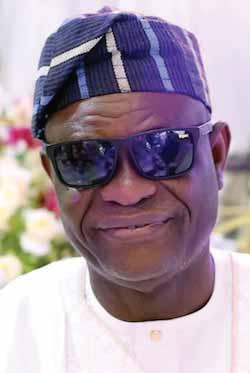
more like a ‘lookman’ as the slang goes. He said the reason was because each assignment he gave me, I always delivered, and he counted on me to be around him whenever he determined to deliver results. Concluding, he told me that what I was doing at ThisDay was the result of those assignments that I was being given and which I managed to deliver.
The Central Bank of Nigeria (CBN) took a strategic step to enhance transparency and boost market confidence with the inauguration of the Nigeria Foreign Exchange Code (FX Code) in Abuja.
Six months after, stakeholders’ assessment shows that the FX Code has so far ignited naira rally at both official and parallel markets, with the local currency exchanging at N1,530/$ from N1,585/$ it exchanged in February when the policy officially took off. The code has also supported foreign reserves accretion and entrenched transparency, governance, and compliance in the foreign exchange market.
Globally, the quest for a transparent and efficient foreign exchange market has continued to be top priority of central bank managements.
For Nigeria, the inauguration of the Nigerian Foreign Exchange Code (FX Code) was a strategic step to move beyond rhetoric, and entrench accountability, compliance, and transparency in the country’s foreign exchange market.
Six months after the policy takeoff in February, the impact of FX Code policy has reverberated across the markets, engendering confidence of local and foreign investors in market.
From the stability in the foreign exchange market to the transparency in forex operations, the market has come to accept the code principles, hailed across board as regulatory success.
The unveiling of the Nigerian FX Code represents a decisive step toward fostering transparency, trust, and integrity in Nigeria’s foreign exchange market.
As part of his reform agenda, the Governor of the Central Bank of Nigeria (CBN), Olayemi Cardoso, launched the FX Code to promote accountability in forex operations.
Speaking at the event, which held at the CBN Head Office Auditorium, Abuja, Cardoso said: “The FX Code marks a new era of compliance and accountability. It is not just a set of recommendations; this is an enforceable framework.”
He said the initiative reflects the CBN’s unwavering commitment to restoring public confidence and setting a global benchmark for ethical conduct in financial markets.
He emphasised that the Nigerian FX Code, which comes on the heels of the Electronic Foreign Exchange Matching System (EFEMS) launched in December 2024, sets clear and enforceable standards for ethical conduct and governance in the foreign exchange market, addressing past challenges that undermined market integrity.
“We must not forget where we are coming from. The era of multiple exchange rates, which created privileges for a select few at the expense of most Nigerians, inflicted significant damage on market integrity.
“Practices such as unprecedented ways-andmeans financing contributed to inflation, currency depreciation, and eroded public confidence. These practices must never return,” Cardoso warned.
He noted that unethical behavior and systemic abuses were key contributors to past issues and vowed decisive action against any breaches of the FX Code.
“We will not tolerate any attempts to revert
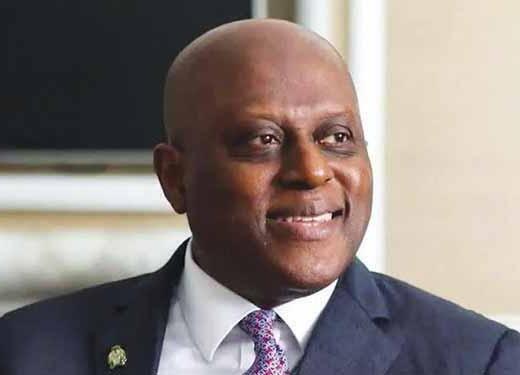
to those practices. Any individual or institution that violates the FX Code will face swift and decisive sanctions.”
Deputy Governor, Economic Policy Directorate, Abdullahi, Muhammad Sani, had highlighted the six guiding principles and the 52 sub-principles of the code.
Director Financial Markets Department (FMD), Dr. Omolara Duke, disclosed that the Nigerian FX Code was adopted from the Global FX Code, launched in May 2017. She noted that Nigeria now joins 54 other central banks in signing onto this global standard.
“The true power of the Code lies in its ability to create a legacy. Our goal is to ensure that Nigeria’s foreign exchange market is seen as a beacon of trust and integrity on the global stage,” Dr. Duke said.
Speaking further she commended all Deposit Money Banks (DMBs) for their collaboration in shaping the Code and urged continued commitment to upholding its principles.
Stakeholders in the banking sector had emphasised the significance of the Nigerian FX Code in fostering a robust and ethical financial ecosystem in Nigeria. The banks had signed the Nigerian FX Code, underscoring a collective commitment to the Code’s principles.
FX Code’s Impact on Naira, Reserves
From exchange rate stability to increased dollar inflows from the Diaspora, FX Code has continued to sustain its usefulness across key segments of the market.
Analysts insist that sustaining this positive impact will depend on banks and other financial institutions compliance with the implementation rules set by the apex bank.
The naira has sustained rally at both official and parallel markets since the launch of the FX Code, with the local currency, reaching its strongest level in over one year, closing at N1,530 to dollar from N1,585 it exchanged by the time the policy implementation official started.
Analysts at Cordros Securities expect the naira to remain relatively stable, supported by robust FX liquidity and sustained inflows from both domestic and foreign sources. This positive outlook is anchored on continued market confidence and attractive naira yields.
The foreign reserves have also recorded significant gain, hitting $40.11 billion last month, making it the highest level recorded since November 2024. The $40.11 billion reserve level representing approximately 9.5 months of import cover, signals a significant boost to country’s foreign currency buffer.
Cardoso had emphasized that the FX Code was built on six core principles: ethics, governance, execution, information sharing, risk management and compliance, as well as confirmation and settlement processes.
These principles, he explained, aligned with international standards while addressing the unique challenges within Nigeria’s foreign exchange market.
According to Cardoso, “The FX Code represents a decisive step forward, setting clear and enforceable standards for ethical conduct, transparency, and good governance in our foreign exchange market. The era of opaque practices is over. The FX Code marks a new era of compliance and accountability. Under the CBN Act 2007 and BOFIA Act 2020, violations will be met with penalties and administrative actions.”
Views from Stakeholders
On his part, President, Association of Bureaux De Change Operators of Nigeria (ABCON), Aminu Gwadabe, attributed the ongoing rebound of the naira against the dollar and other world currencies to the CBN’s policies.
Gwadabe hinged the naira rally to the newly implemented Foreign Exchange (FX) Code, rising investors confidence, and policies supporting more dollar inflows through diaspora remittances.
He backed the apex bank’s position that the FX Code is comprehensively addressing various aspects of market conduct and practice, it is not intended to be exhaustive.
He said the policy authorises the CBN to establish and enforce directives regarding the standards for financial institutions under which FX deals are to be conducted.
Gwadabe said the code will further entrench transparency and accountability in the FX market, and continually sustain the naira rally.
He also backed CBN’s position that all institutions engaged in the foreign exchange market must also provide the CBN with a detailed implementation plan outlining how they intend to achieve full compliance with the FX Code.
These plans are expected to be formally approved and signed by the institution’s board of directors, and it must be accompanied by relevant extracts from the board meeting where the plan was reviewed and endorsed.
CEO, Countryside Markets Limited, Stevens Michael, said: “For me, the whole idea is just to ensure that there is a lot more sanity in the foreign exchange market because those characters have really created a whole lot of problems over the years in the foreign exchange market”.
“I think that is what the CBN is trying to do, and the more we’re able to sanitise the markets, I think the more stability it will achieve in the foreign exchange market,” he said.
The CBN has stated that while every effort has been made to ensure that the FX Code comprehensively addresses various aspects of market conduct and practice, it is not intended to be exhaustive.
Cardoso also noted that the journey towards market reform is already yielding results. He stated, “The year 2024 was marked by structural reforms that sought to return the naira to a freely determined market price and ease volatility as several distortions were removed from the market.”
Beyond the foreign exchange market, the FX Code forms part of the CBN’s renewed focus on compliance across the financial sector. Its six guiding principles, alongside 52 sub-principles, were designed to become the benchmark for conduct across all participating institutions.
In an emailed report to investors, Head of Research at Commercio Partners, Ifeanyi Ubah, said the CBN retained the Monetary Policy Rate (MPR) at 27.5 per cent following the conclusion of its 301st Monetary Policy Committee (MPC) meeting.
He said the need to sustain the recent disinflationary trend and keep price pressures under control could be responsible for the rate retention.
In a country navigating the turbulence of bold reforms and long-overdue structural change, President Bola Ahmed Tinubu’s recent gesture to reward the Super Falcons with $100,000 (Naira equivalent) each, three-bedroom houses, and national honours has sparked a mix of celebration and criticism.
But let’s step back and ask: Was it wasteful, or was it wise?
The answer lies not just in economics, but in psychology, politics, and timing.
A Moment of National Pride in a Period of National Pain
There’s no denying that Nigerians are hurting. With subsidy removal, inflation, currency depreciation, and sectoral unrest—from health workers to educators—the nation is enduring the discomfort of critical, unavoidable reforms.
However, national healing doesn’t happen through policy alone. Sometimes, it begins with symbols—images and stories that make people
believe, even briefly, that their country can win.
The Super Falcons did just that. Amid a difficult season of sacrifice, they gave Nigerians something priceless: pride. The president’s decision to reward them was not just about football—it was about acknowledging excellence, inspiring the youth, and reinforcing a message that success in Nigeria can still be honoured.
Psychology of Hope: Why Symbols Matter In public psychology, symbols serve as anchors during transformation. When governments are rolling out painful reforms, they must also create moments of unity and celebration to balance public morale.
Tinubu’s gesture taps into this psychology. It tells Nigerians: we see you, we value effort, and even in tough times, we still celebrate those who raise our flag high.
That’s not wasteful—it’s strategic morale management.
Politics 101: A Gesture the Opposition Can’t Touch
From a political standpoint, it was a tactical masterstroke. No serious opposition party can afford to criticise the gesture without alienating
young Nigerians—especially women—who see the Falcons as role models.
To criticise the gift is to seem anti-youth, antisport, and anti-success. But to openly praise it is to indirectly endorse the administration’s wisdom, weakening their oppositional stance.
The president essentially made a move that’s politically unassailable—a rare checkmate in Nigeria’s often-polarized landscape.
The Bigger Picture: Reform is Not Void of Recognition
The critics are not wrong to point out the challenges in the health and education sectors. But here’s the fuller view: Tinubu’s government is not pretending those problems don’t exist—it is already working to fix them.
The administration is pushing reforms in fuel pricing, foreign exchange, power, infrastructure, and tax. These are difficult but necessary shifts aimed at undoing decades of rot. And in such a season of reform, moments of celebration are not distractions—they are bridges across the pain.
One can invest in public morale and invest in hospitals. One can reward footballers and fix the schools. These are not mutually exclusive paths.
Leadership Must Inspire and Build
Leadership is not only about solving problems—it’s also about making people believe the sacrifice is worth it. If the president had ignored the Falcons’ success in the name of austerity, the narrative would have been that Nigeria doesn’t reward excellence, even when it shines globally. Instead, the message is loud and clear: Nigeria honours those who uplift her image, and Nigeria is rebuilding itself.
The Super Falcons gave Nigerians a reason to smile in a difficult season. The president, in turn, gave them a reason to believe that their sacrifices are not in vain, and that their leaders are watching.
Critics may question the timing. But history will remember the intent. And in politics—as in leadership—symbols often move people faster than spreadsheets.
The house and cash may fade from headlines. But the message? That may echo far longer. July 29, 2025
Belgore is the Managing Director of Utica Capital Limited.
You were one of the experts that attended the 2025 Accra Weizo in Ghana. What was the motivation?
My company, GOTA International Group, is into international travel and tourism in West Africa. We say in our slogan, we are bridging Africa and the world with excellence since 2009. The visioneer of Akwaaba, Ikechi Uko, who also is the visioneer of Accra Weizo, we met for the first time at the World Travel Market in London in 2011. After that experience, he gave me a platform to speak on my experience between Benin and Nigeria border. Because I’m a Nigerian, but I’ve been in Benin for the past 26 years, and by God’s grace today, I’m Beninese by naturalisation. Then we used to have a very tough one by the border. He granted me the opportunity to speak on several panels addressing ECOWAS and that led to the Benin and Nigeria border especially Seme border to be precise being opened unofficially before the time. So the challenges we were going through tourism events were kind of breached before the official time. And this has also opened a lot of doors between Nigerians and Beninese.
As a Nigerian living in Benin for these years, we started what we call, weekend Francophonie and weekend Anglophonie. Bringing Nigerians to Benin from Friday to Sunday, where we expose
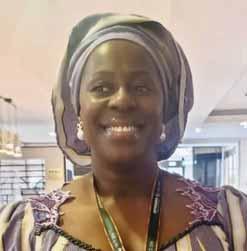
them to the opportunities in Benin and make them speak French. Also weekend Anglophonie, where we take Beninese to Lagos, make them experience English for three days, and then also the business opportunities. So this since 2009, has given birth to a lot of businesses that we have in both countries. In 2016, we took it beyond Benin. Today, we began the business summit of West
Africa in Turkey, with the Turkey Chamber of Commerce. We work with DELIC, we work with NUSIAD. It was our first experience in Turkey where we took the Ambassador’s wife to Turkey that pushed the Turkey DELIC to come visit the Benin Chamber of Commerce. That was 2014 and 2015, the discussions led to the Ambassador of Turkey Embassy coming to Benin. In 2016, the Turkish Airlines came to Benin. I must say that we have done a lot of things between these countries and beyond. Today, what we do with the Turkish business group has given birth to medical tourism. We represent two big medical tourism bodies of Turkey in Africa. A lot of things that we’ve been able to birth out of these relationships and we have received awards internationally. In 2016, the present President of Benin came into power and wanted to reform Benin tourism. In 2017, he selected six tourism consultants from all over the world that were going to help reform Benin tourism.
In 2018, I became one of the tourism consultants among the six that significantly affected the relationship between Benin and Nigeria. I represent the Nigerian tourism interest at the Benin tourism body, which is called IMPT. We worked on putting the roadmap together. Today, we have Amazon and others. I’m the only one living in Benin among the six tourism consultants. Then what we’re able to do is to say, we want to tell the story because
there was no emblem of Benin before then. We sat down and they wanted us to have the emblem to be something else. But we said we wanted an emblem that will be liked, an emblem that will affect everything, that will speak for the woman. And because of that dynamic story we have of the woman king from Abomey, the twin sister of the king when the brother died in war she wore his dress and ruled Benin for three years without the people knowing that she was actually a female. What did she do? She was able to build the Agogie. The Agogies are the women warriors. That’s what we were able to bring out as our emblem. Today, when you visit West Africa and you have not visited the Amazon statue of Benin, you have not visited West Africa. That is part of the things that we realised. In 2013, I was made the representative of Akwaaba in the Frenchspeaking countries, Benin and Togo. In 2016, we brought about 10 travel agencies from the two countries. At the 2025 Accra Weizo, Benin and Togo participated in panel discussion. The relationship GOTA entered into with Akwaaba is now a game-changer for the French-English speaking countries. Today in Benin tourism, we have Akwaaba listed as the platform where operators of Benin and Nigeria meet.
Can you tell us about your resort?
It’s a beachfront resort with 75 rooms, three points of sales for food and beverage, a night club and different areas for kayaking.
What is your business vision?
The business is to progress with tourism activity in the same vision with the state.
You’re upgrading the resort. Why?
Right now, we’re upgrading the resort because there was no good road here before. Now, we have a good road network that comes from Cotonou via the beachside and this is good for our business. That is why we’re upgrading all the facilities so that we can attract more clients. It’s a big project that will last for five years. It will be a big challenge for us but we’re ready to make it happen.
With the good road network, aren’t you afraid of competition?
We are not afraid of competition. We are happy with the competition because that’s what’s going to help us to upgrade the level we’re at now. It will be challenging for us at first, but then,

Tit will be okay. We want the resort to meet international standards.
Talking about international standards. In terms of service what should tourists expect?
We occupy the first position in terms of amenities and services we provide. We provide
he Co-founder of Diamond and Pearl Travels, Mrs. Wonuola OlatundeLamidi, has called on Nigerians to take ownership of tourism assets and endowments domiciled in their communities, saying this is the only way to protect these assets and make them economically viable for the communities.
Olatunde-Lamidi, who made this call as one of the panelists at the BusinessDay Tourism Conference held at Eko Hotels and Suites, Lagos, said, “We fly to Zanzibar for beaches and waterfronts that we already have in Badagry, Calabar, and other places in Nigeria. Local communities must own, protect,
excellent services to our guests.
What are those facilities?
We have a swimming pool, tennis courts, golf course, night club on the spot, kids club, Kayaking, conference room, two points of sales and Spa for wellness. All of these are of international standards.
Are there plans for clinics?
No. Clinic is about seven kilometres away from Quidah. It’s about 15 minutes from here.
The World Tourism Council recently gave a list of the top 10 tourism economies in the world and there was no African country on the list. You have countries like India, Mexico and others. What are the key lessons and what do you think can be done to ensure that African countries become part of that list?
Maybe the economic level of the population could be responsible. Also, poor transportation and the infrastructure, especially roads could have contributed. These things help the countries to upgrade their economy.
What are your plans for the future?
As I said before, we are upgrading the resort to international standards. So in the next 4-5 years,
the resort will receive a facelift going by the big project we are working on. In the next 10 years, we are positioning ourselves as the best resort in West Africa. When we finish these new projects, it will become a 5-star resort.
What are those facilities that you are working on?
Lodging, private swimming pool, private villa, boating also, Jet ski and many other amenities.
Any plans for a zoo?
We are not in this position because we are at the beach front. The climate will not help us to make a zoo on the spot. Maybe a small area with animals will be okay.
Who are your customers?
The middle-class people and the VIPs.
President of Benin is said to be tourismfriendly?
Of course, he works a lot. During his 10 years, he does a lot for the country especially roads, electricity and tourism. He is working on a 100km beach front, a huge project.
and profit from their beaches.”
She explained that her company not only offers local and international travel experience to clients, but is also active in giving back to the communities the company operates in.
Keynote Speaker, Managing Director of Del-York Development Company, Stella Fubara, emphasised on tourism sector’s tremendous potential using Dubai as a case study.
She explained that while Nigeria’s tourism sector currently contributes less than four per cent to Gross Domestic Product (GDP), compared to Kenya’s nine per cent and Morocco’s 12 per cent, she viewed this as significant room for growth rather than a limitation.
According to her, the federal government targets a $1 trillion economy by 2030. She implored stakeholders to see tourism as a critical engine ready for acceleration.
Apart from showcasing the opportunities within Nigeria, she challenged tourism practitioners to transform inconsistent service delivery into standardised excellence, developing infrastructure gaps into competitive advantages, and building international marketing presence rather than viewing these as obstacles.
The tourism conference brought together over 200 tourism advocates, industry stakeholders, and travel enthusiasts in what proved to be an energetic launch to serious conversations about Nigeria’s tourism future as the country enters the second half of 2025.
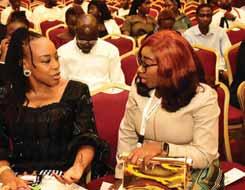
10 years after his passing, the legacy of His Imperial Majesty, Oba Okunade Sijuwade, Olubuse II, the 50th Ooni of Ife, continues to shine brightly, writes Sunday Ehigiator
It was an atmosphere soaked in grandeur, tradition, and reverence as the memory of His Imperial Majesty, Oba Okunade Sijuwade, Olubuse II, was celebrated ten years after his passing. The commemoration was more than a memorial; it was a grand festival of royalty, heritage, and nationhood.
The venue transformed into a royal court from the moment the gates opened, bursting with colour, cultural opulence, and symbolic regality.
Ornate traditional attire flowed like rivers of fabric in rich white, indigo, gold, and coral red hues. The scent of incense and native perfumes wafted through the air as Yoruba chants, talking drums, and flute melodies carried the spirit of Ile-Ife across the space.
Attendees included dozens of traditional rulers from across Nigeria, from Yoruba kings in Osun and Oyo, to Northern emirs and Southeastern Igbo monarchs. Also present were political leaders, diplomats, scholars, and descendants of royal households. It was a gathering befitting a monarch widely regarded as ‘Oba awon Oba’ (the King of Kings).
A Regal Legacy Celebrated in Style
Two major events defined the day’s commemoration: The Oba Okunade Sijuwade Legacy Exhibition and the Oba Okunade Sijuwade Symposium.
The exhibition, curated with royal artefacts, portraits, personal effects, historical photographs, and documents of the late Oba, took attendees on a journey through Oba Sijuwade’s illustrious reign.
It reflected his modern yet deeply traditional approach to leadership, from his global diplomatic engagements to his intimate interactions with palace chiefs and spiritual custodians in Ile-Ife. The symposium, meanwhile, gathered scholars, royalty, and statesmen to reflect on his life’s work and legacy, with conversations spanning politics, religion, culture, diplomacy, and education.
A King of Style, Wisdom and Unity
Speaking with THISDAY, Prince Akinade Adenekan Adebunyi of the Oshunkola Ruling House in Ife shared personal memories of a monarch he regarded not only as a leader but a close confidant.
According to him, “Kabiyesi was a king of kings. A man of incredible style and discipline,” he said. “He wasn’t just a traditional ruler; he was a strategist, a statesman. During the political crisis threatening President Obasanjo’s administra- tion, it was Kabiyesi who called for calm, who reached out to the Emir of Kano and brought leaders together to preserve the unity of Nigeria.”
Prince Adebunyi emphasised Oba Sijuwade’s deliberate efforts to strengthen ties between northern and southern Nigeria, and his vision of national cohesion long before it became a political buzzword.
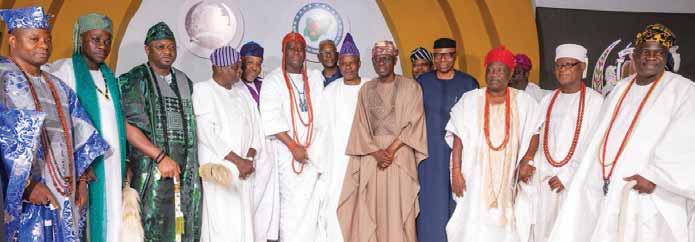
L-R: Alayemore of Ido Osun, Oba Olayinka Jokotade; Olofin of Isheri, Olofin of Isheri, Oba Sulaiman Bamgbade; Former Governor of Osun State, Prince Olagunsoye Oyinlola; Eldest son of HIM, late Oba Okunade Sijuwade Olubuse II, Prince Adetokunbo Sijuwade; The Ooni of Ife, Oba Adeyeye Enitan Ogunwusi; Former ambassador of Nigeria to Germany, Chief Akin Osuntokun; Former Governor of Ogun State, Senator Ibikunle Amosun; Governor of Lagos State, Babajide Sanwoolu; Former Governor of Ondo State, Olusegun Mimiko; The Orangun of Oke Ila, Oba Adedokun Abolarin; and the Olugbon of Orile Igbon, Oba Francis Olushola Alao, at the Ooni’s 10th Memorial Celebration recently held in Lagos
A Father to Many, Giant to All
Also speaking, the late monarch’s daughter, Princess Adenekan Adebunyi, offered a more personal portrait of the king, one of compassion, discipline, and inspiration.
“He made us strong. He believed in education and raised us to succeed, to be honourable. That’s the legacy we continue to live. We didn’t realise how many lives he touched until we began planning this remembrance.
“My father was a lovely man, and he was a father to many. He nurtured us, made us strong people to withstand everything. And to him, education was very important, which we all excelled at and ensured that we could make a future for ourselves. So, today we’re celebrating him and honouring him.
“He touched so many lives. When we started this, we didn’t know how many people he had touched in their lives and had an impact on. So, today is a celebration of him, remembering the good he did for the country in bringing Ife to light. Going to so many foreign lands where he was recognised as the Ooni of Ife. He even met the Queen in England when she was alive. She came to Ife as well.
“So, it’s a celebration of his journey through life and his impact on the people he’s touched.
“We never forgot him, but today we’re bringing to light
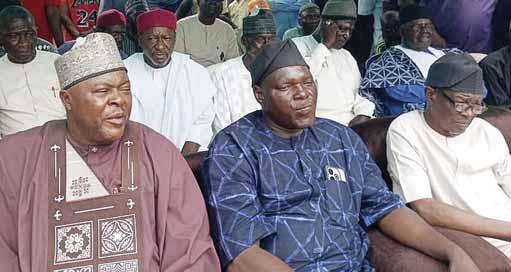
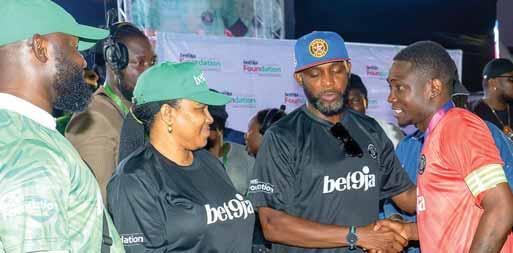
everything he’s done. And letting people see how impactful he was, how powerful he was, how his reach was. He touched not just people in Nigeria, but he touched people abroad as well.
“So, today is really important in highlighting the good he did whilst he was here. As far as I’m concerned, there’s no one like him that I’ve met or will ever meet. He was one of a kind.
“You see it now. You see all of us working hard. That’s how he trained us to be good at everything we do.
“So, we’re self-sufficient, we honour him, we’re honourable, we keep his memory alive. And one thing he always told us was, and that is what guides our lives. Thank you very much.” Her voice, laced with emotion, underscored the event’s deeper meaning; this was not just a royal celebration, but a familial tribute to a father who left a timeless imprint on his children and his people.
The King Who Took Ife to Harvard
Harvard University professor and cultural historian, Prof. Jacob K. Olupona, who was the keynote speaker, shared insights from his close encounters with Oba Sijuwade, notably during the monarch’s official visit to Harvard.
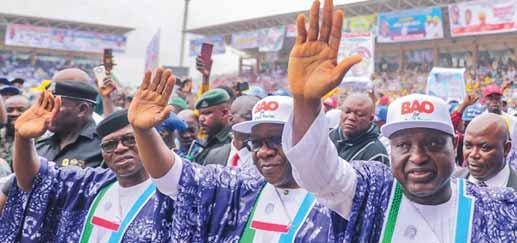
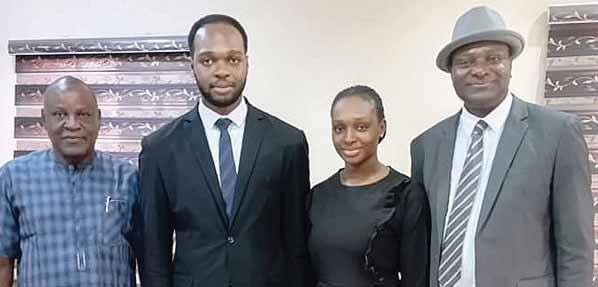
Stakeholders in Nigeria’s automotive industry came together to call for deliberate and strategic investment in local content development at the second edition of the Nigeria Auto Industry Summit (NAISU), held in Lagos, recently, under the theme: “Nigeria First: Local Content as Catalyst for Automotive Economy.”
The summit, jointly organised by the Nigeria Auto Journalists Association (NAJA) and the National Automotive Design and Development Council (NADDC), attracted top stakeholders across government, regulatory agencies, manuevent aimed to forge a sustainable roadmap for Nigeria’s automotive industry through homegrown capacity and innovation.
Setting the tone with a compelling address, NAJA Chairman, Mr. Theodore Opara, declared that Nigeria’s path to industrialisation must be led by a robust automotive sector driven by local content.
“If Nigeria must industrialize, the auto sector must lead. If the auto sector must thrive, local content must be the engine,” he asserted.
Opara criticised the nation’s continued dependence on imported vehicles and components—including tyres, batteries, and brake pads—despite Nigeria’s vast natural policy inconsistency, weak coordination, and poor stakeholder commitment as key obstacles holding back local manufacturing.
He urged stakeholders to embrace the mantra: “Buy Nigeria. Drive Nigeria. Trust Nigeria.” According to him, only a collective commitment can change the narrative.
the NAJA Training Workshop, and the Annual NAJA Awards.
Mr. Joseph Osanipin, Director General of NADDC, reinforced the urgency of localisation, describing local content as a strategic imperative.
“It’s the engine that will drive economic transformation,” Osanipin stated.
He cited ongoing NADDC initiatives such as
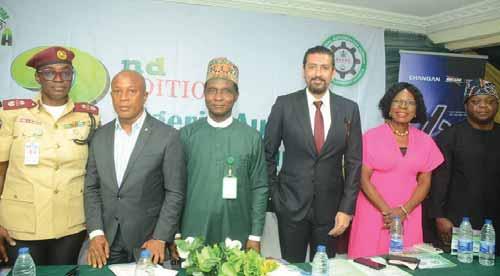
L-R: Zonal Commanding Officer, FRSC RS 2 (Lagos and Ogun states), Assistant Corps Marshal Ann Oladayo; Chairman, Nigeria Auto Journalists Association, Theodore Opara; Representative of Standards Organisation of Nigeria, Engr Danmola Abayomi; MD, Stallion VON Nigeria, Dr. Harpreet Singh; Deputy Director, National Automotive Design and Development Council, Deaconess Felicia Oyebolu; and Managing Director of Lanre Shittu Motors, Mr. Taiwo Shittu, at the 2nd Nigeria Auto Industry Summit held in Lagos... recently
production incentives, skills development, and research and development support, aimed at laying a solid foundation for a resilient local automotive ecosystem.
Osanipin acknowledged challenges in areascessing but urged stakeholders to rally behind the “Nigeria First” campaign for long-term industrial progress.
Representing the Corps Marshal, Assistant Corps Marshal Ann Oladayo of the Federal Road Safety Corps (FRSC) stressed the intrinsic link between automotive design, road safety, and local manufacturing standards.
“As we localise production, we must not compromise on safety and environmental standards,” she cautioned.
She pledged the FRSC’s continued collaboration with industry players in shaping
transport policies that uphold innovation, ethics, and public safety.
Earlier in his presentation, Prof. Oscar Odiboh of the Mass Communication Faculty and Media Studies, Delta State University, called for concerted local content drive in Nigeria’s auto economy.
He called on President Tinubu to establish a National Automotive Economy Agency to drive expanded investment and growth in the sector.
The proposed agency,he said, should be led by a Director-General, and will focus on unlocking the full economic potential of the automotive sector, attracting investors, and delivering longterm value across the value chain.
Prof. Odiboh suggested that the agency be launched with a $5 billion seed grant and designed
The federal government has said it will continue to deliver workable reforms for small and medium sized enterprises (SMSE), as they scale, manufacture, and produce.
“We want them to be competitive”, said the Minister of Industry, Trade and Investment, Dr Jumoke Oduwole during her visit to the electric vehicles assembly plant of SAGLEV in Ikorodu, Lagos, recently.
The Minister, who said she was visiting an EV plant for the first time, was accompanied by the Directo General of the National Automotive Design and Development Council (NADDC), Joseph Osanipin. Oduwole said, “This administration, from industrial policy to trade policy to investment policy is focused on Nigerian investors and putting them first. So, this is my first time in this capacity, visiting an EV plant and just to see the dexterity, the range of products available. This is affordable, this is sustainable. This is what can really jump start our transportation logistics businesses. So from a business perspective, they’re affordable. Vehicles under N20 million. There’re also opportunities for credit, and so that’s another thing that young Nigerians can look at. We talked about the transportation business Uber drivers, bolt and how they can lease vehicles like this, and they have the track record through technology to prove to their banks. We have the bankers to this project.
She said, “The Nigeria first policy of President Bola Ahmed Tinubu is committed to supporting investors exactly like the demographic we’re seeing here.”
She said the ministry had a domestic investors summit that focused on medium to large sized enterprises. “Now you would know that this project (SAGLEV EV plant) has been five years in the making, so the investor has committed significant funds, and what you see is an off take, an offshoot of years of planning, years of training, years of collaboration, partnerships, and now we have the fruit of it.”

On the company’s models, she said, “We’ve also have the highend range. I had the privilege of driving the highend range, and I really enjoyed it. You can see from my smile, these are vehicles that use like 80% less of power. I got the statistics from the chairman, and it’s really what can take Nigeria to the next level. What can help productivity, with projects like our coastal road. You know what that’s going to mean as a multiplier effect for the Nigerian economy. And so I’m really excited to see the opportunity of this supply for the demand that is in the Nigerian economy. Nigerians are extremely patriotic.”
Nigerians, she said like product made in the country, saying, “I think that we should stop this rhetoric of Nigerians not patronising Nigerian products. This is an investor who has brought in a product that is Chinese and going to be domiciled here,
that’s in manufacturing. He also has his own brand that will be manufactured right here. SKD means you put different levels of finishing touches, but all the way with the opportunity to scale to CKD that’s the completely knocked down part to be manufactured here. This is what creates jobs. This is what makes competitiveness and this is what makes an economy grow. There’s no shortcut to the work it takes. So we really need to acknowledge and support investors who have taken the hard road of going to finding land, finding technical partners, going through trade facilitation with our ports, all the reforms that are ongoing now, and making sure they’re training young Nigerian technicians, making sure they’re also looking to how they would expand after finishing the Nigerian market, or even while finishing the Nigerian market, exporting to the African continental free trade area.
Car brake repair and brake servicing are important parts of proper vehicle maintenance. When you take care of your brakes, they’ll take care of you when you need them most. However, even with regular maintenance, the brakes on your vehicle may require a professional inspection and servicing if you encounter one or more of these eight brake problem warning signs and symptoms.
1. Brake Light On
If a brake light indicator appears on your dashboard, it’s either time for your regular maintenance or it’s an alert to a potential problem. These are some of the more common dashboard alerts that appear in today’s vehicles. Note: Consult your vehicle owner’s manual for possible causes for these and other indicators.
Brake Pad Indicator
This light lets you know your brake pads may be wearing out, along with other non-visible reasons. Either way, get them inspected at Les Schwab.
Brake Fluid Level Indicator
This light will flash when your brake fluid levels are low. You may be able to top off the fluid to keep your brakes functioning properly, or stop by your local Les Schwab and we’ll give you a hand.
Parking Brake Indicator
When this light appears, your parking brake is either engaged or there is a problem with it. To diagnose the possible issue, engage and disengage your parking brake. If the indicator goes away, there are no issues. If it still won’t go away, come to Les Schwab.
2. Squealing or Squeaking Noises
Odd or unusual noises coming from your brakes aren’t always a sign of problems. It could just be a foreign object lodged in your brakes (a pebble or debris). It could also be your brake-pad wear indicators. These bits of metal in your brake pad come in contact with the rotor to emit a high-pitched noise when you apply the brakes. This lets you know it’s time to get your brake pads replaced.
3. Grinding Noises
Grinding noises, whether you have disc or drum brakes, could mean your brakes need servicing right away. In some cases, the sounds may be the brake pad or shoe scraping on metal contact points. A trip to Les Schwab is recommended when you hear or feel any form of brake grinding.
4. Wobbling, Vibrating, or Pulsing When Braking
If your steering wheel or vehicle shakes, vibrates, or pulses when you apply the brakes, it could be an uneven rotor. Brake rotors, which are a vital part of your disc brakes, are large metal discs attached to both ends of your vehicle’s axle. When you hit the brakes, the brake pads push against the rotors, which stops your wheels from spinning.
Wobbling, vibrating, or pulsing can occur if the rotor surface area is not flat (has uneven areas). Over time, it’s normal for the rotor surface to wear down and possibly become uneven. Braking friction, when you apply the brakes, results in the transfer of pad material to the rotor surface. If the pad material transfers unevenly, you may experience vibration when braking. Left uneven, the material will continue to accumulate, worsening over time. During brake servicing, the face of the rotor should and keep you from feeling a wobble when you brake. If the rotors are too far worn to be serviced, they will need to be replaced.
5. Leaking Fluid
When you apply your brakes, a lot of things happen all at once. An important part of the to create hydraulic pressure, which pushes the brake pad against the rotor (the large metal disc attached to the end of your axle). be able to stop safely. Check your vehicle’s Schwab and we’ll be glad to help.
6. Spongy or Soft Brakes
When you press on the brakes, you want to feel some resistance. If they feel soft or the could indicate air or moisture in the braking system.
Source: Les Schwab
Ferdinand Ekechukwu - 08035011394
Email: ferdi_adthisday@yahoo.com
Ferdinand Ekechukwu
Originally named after him for his long-standing relationship with the Gbagada area of Lagos state, veteran Nigerian musician Charles Oputa, aka Charly Boy, may truly not be fazed following the renaming of the eponymous Charly Boy Bus Stop to Olamide Baddo Bus Stop as it remained to be seen how it would deface his socio-cultural legacy or diminish his towering popularity.
Recently, the Bariga Local Council Development Area (LCDA) announced the renaming of several places in the local council and inaugurated some community-based projects. According to the chairman, the renaming initiative aims to honour notable individuals who have contributed to the growth and image of the Gbagada-Bariga community.
A couple of other streets within the vicinity were also renamed after music celebrities who
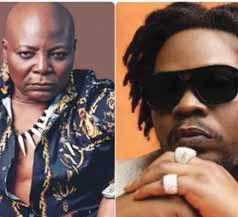
including King Sunny Ade, Abolore Akande aka 9ice, Tony Tetuila, and Olamide himself. 9ice’s bop, ‘Little Money’ comes to mind here
and inspires some questions… but this is not for 9ice or about him alone.
Widely celebrated street-hop artist and Bariga bred Olamide Adedeji aka ‘Baddo Sne’, is reputed to have placed Nigeria on the global map through music.
Lagos, to the global stage, with a career marked by resilience, reinvention, and realness. So on the surface, the decision may appear harmless or even laudable as one opined.
Charly Boy, on the other hand, is one of Nigeria’s music industry, whose works propelled him to national fame. Often referred to as “Area Fada,” a nickname connoting a folk hero, Charly Boy has carved a niche for himself through his alternative lifestyle, bold commentaries, and a career that spans music, television, and acting, long before His journey as a cultural icon is deemedties who revolutionised the way of the present
We have car chases and car stunts. We have
Renowned singer, songwriter, record producer, and television producer Abdulrasheed Bello, popularly known as JJC Skillz, cinematic project titled ‘Hakeem: Seeking Justice.’ delves into the harsh realities of a society plagued by systemic injustice and deep-rooted inequality. With a compelling storyline and powerful performances, ‘Hakeem: Seeking Justice,’ follows by Deyemi Okanlawon, who relentlessly sought out justice, disregarding the normal course of things. The movie not only delivers intense action but also raises critical questions about in a broken system.
Renowned for music, JJC also added a musical major acts jump on a rap track to promote the

Ferdinand Ekechukwu
At a time when global streaming giants Amazon Prime and investments on the continent, a bold new platform is stepping up to give Nigerian stories the spotlight they deserve. Recently, Inkblot Studios and Filmhouse Group joined forces to launch KAVA, the dedicated global and African content.
Set to launch in August 2025, KAVA are told, shared, and celebrated across the industry in the world by volume, has long been underrepresented on major streaming platforms despite an increasing demand for authentic African narratives, especially among diaspora audiences. KAVA is here to change that narrative.
powerful tool. And that’s why Afrobeats is where Afrobeats is now. And it’s a wonderful tool to sell products, for branding.
And I decided, okay, that’s the tool that I know best. Let me use it to help sell my movie.”
This marks another bold step for JJC Skillz
blending social commentary with entertainment to spark conversations that matter. On why he decided on this production, he disclosed that, “Well, I believe that Nigeria has conquered drama horror. Those two, I haven’t seen a Nigerian
I mean, almost all of us here, when there’s eager to watch it as that’s our favorite genre.” it’s very technical, and we don’t want people to which is old school. So intentionally, for this
With its raw, gripping visuals, a hauntingly immersive score, and emotionally charged performances, ‘Hakeem: Seeking Justice’ is poised action cinema in Nigeria.
human story rooted in themes of justice, identity, and resilience.
delivers more than spectacle. It presents a layered narrative that speaks to the struggles of everyday people, resonating with audiences across generations. By blending compelling storytelling with new benchmark for Nigerian action dramas on both local and global platforms.
cast featuring some of Nollywood’s biggest names, including Chioma Chukwuka, Zubby Michael, Bolanle Ninalowo, Gabriel Afolayan,
Nigerian culture.
Fair enough, while there’s no basis for comparison, both Charly Boy and Olamide are not just successful in their rights but cultural icons, have shaped careers and impacted generation
Beyond just renaming the bus stop in favour of the other, it matters more to consider their contributions collectively. The announcement as Charly Boy has often remained a critical voice. Instructively, there’s been an earlier attempt to rename the landmark Charly Boy bus stop but was not backed by action. This time, the outgoing Chairman of the LCDA in a swift move to carry out the name change, installed signage.
“You can replace the signboard, but you can’t a voice that shook your tables for decades!”, Charly Boy posted on X. To Charly Boy, the move to rename the place is silly, petty and more so not a priority. “I don’t know why they do the things they do, because it seems to be a little petty… because those are not the things we should be talking about right now.
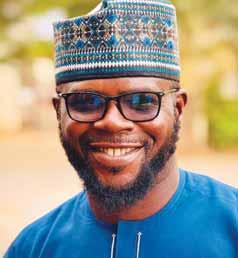
Award-winning director Imoh Umoren is set to make a highly anticipated return to the screen with Lekki,
thriller set in the bustling city of Lagos. The director announced that principal photography for the series has wrapped, with a release slated for streaming this September.
‘Lekki’ follows the story of Awase, a woman attempting to turn her life around after fall-
“KAVA is where cutting-edge technology meets cultural storytelling,” said Chinaza Onuzo, co-CEO of KAVA and head of Inkblot Studios. KAVA will launch with over 30 premium Nollywood titles, featuring creators across Nigeria and the African diaspora. Titles will include Alakada Bad and Boujee, Owambe Thieves, What About Us and House Job.
The platform will add new content weekly, ensuring a consistent stream of fresh, cinema-quality entertainment for viewers globally. “This is more than a platform. It’s an ecosystem for African content, focusing on underserved global demand,” said Kene Okwuosa, co-CEO of KAVA and Filmhouse and also represents both a cultural leap and a commercial opportunity.
building the digital infrastructure for the future of African cinema. We want our audiences to feel the joy of seeing their language, their humour, their struggles, and their triumphs
Babatunde political dynasty. As she tries to leave behind her past as a socialite with a from her former life begin to resurface— bringing blackmail, mystery, and a trail of disappearances and deaths in their wake.
As secrets threaten to unravel, the Babatunde family will stop at nothing to protect their legacy and untarnished public image.
The series stars Awe Ayobami—an emerging force in Nollywood, previously seen in Kemi Adetiba’s ‘To Kill a Monkey’and
on screen. To feel seen, and like they’re part of something bigger.” KAVA will be available via subscription globally on mobile devices, tablets, and Smart TVs.
into AVOD (advertising-based video on series after its launch, creating a holistic streaming hub for African entertainment.
reach 46.3 million users by 2029, the launch
In a related development, EbonyLife Group had earlier announced the upcoming launch of EbonyLife ON Plus, a digital platform designed to entertain, empower, and elevate. While the debut is just around the corner. “EbonyLife ON Plus is coming soon — and it’s unlike anything the world has seen and at a price EbonyLife Group, Mo Abudu said.
M-Net’s Between Worlds—alongside Racheal Emem Isaac, known for her role in ClarFranklin’s Madam Koi Koi. ‘Lekki’ marks a reunion for Umoren and Isaac, following their collaboration on 2024’s Adeola Awodein, Ejovwoke Obas, Chinaza Ezeani, and Callistus Akunaeziri, with Zoe Douglas making her screen debut.
Channel 77, and anticipation is high among fans of his distinctive visual storytelling and genre-blending narratives.
the world EbonyLife ON Plus is more than a streaming service. It’s a bold new digital
hospitality and education. But storytelling isn’t only about what we watch, it’s about how we live. With EbonyLife ON Plus, we are creating a destination that empowers, entertains and elevates lives across the globe.” She added that “This is not a subscriber model. It’s a membership movement built on community, not transactions. At its core is a deep belief in purpose, identity, and connection. Members will enjoy access to EbonyLife Media Originals, featuring award-winning collection of Nollywood Gold classics will celebrate the cinematic legacy of Nigeria, while international titles from Sony Pictures bring blockbuster storytelling to African screens.
Oluchi Chibuzor
The recent decision to pause the implementation of certain provisions in the Financial Reporting Council (FRC) Amendment Act 2023, following concerns raised by private sector stakeholders, has reignited debate over the balance between regulatory independence and stakeholder engagement.
While dialogue with the private sector is vital in a democratic setting, undermining a duly enacted legislation sets a dangerous precedent for regulatory governance in Nigeria.
The FRC, like its counterparts in the UK, Mauritius, and the U.S, was established to serve as an impartial arbiter of corporate reporting and governance standards. Its independence, enshrined by law, is crucial in shielding the Nigerian economy from financial misreporting, corporate abuse, and systemic risks. Any move that weakens this independence — whether through administrative fiat or external pressure — risks reducing the Council to a symbolic institution incapable of fulfilling its oversight mandate.
The federal government had suspended the implementation of contentious provisions in the FRC (Amendment) Act 2023, following extensive consultations with industry stakeholders.
The FRC is tasked with developing, publishing, monitoring, and enforcing accounting, auditing, actuarial, valuation, corporate governance, and sustainability standards for Public Interest Entities (PIEs) in Nigeria through its seven specialised directorates.
Minister of Industry, Trade, and Investment Dr. Jumoke Oduwole recently announced the suspension after high-level engagements with key industry groups, including the Nigeria Employers’ Consultative Association (NECA), the Association of Licensed Telecommunications Operators of Nigeria (ALTON), and the Oil Producers Trade Section (OPTS).
One of the contentious issues is the reclassification of large private companies as PIEs, requiring them to remit annual dues of between 0.02 and 0.05 per cent of turnover without a ceiling. Some had argued that this contrasts sharply with the N25 million cap applied to publicly listed companies, raising fears that such provisions could escalate compliance costs and dampen investor confidence.
But in comparison with the same fee charged in Kenya, Ghana, South Africa, and the UK, the FRC maintains a fee structure that falls within the global standard. For instance, while in Kenya, it is within 0.03 and 0.05; Ghana – 0.1 and 0.5; South Africa – 0.02 and 0.1; UK -£1,500 -£50,000, and the U.S.A – 0.00015310%.
Oduwole had stressed that the pause reflects President Bola Ahmed Tinubu’s pro-business stance under his administration’s 8-Point Agenda. She noted that a stakeholder consultation was held on March 26, 2025, leading to the administrative pause and the creation of a Technical Working Group to review the contentious provisions and propose workable reforms.
In a joint statement, however, the Nigeria Employers’ Consultative Association (NECA) and other members of the OPSN had commended Tinubu for suspending contentious provisions of the FRC (Amendment) Act 2023.
Signed by the heads of MAN, NACCIMA, NECA, NASSI, NASME, and endorsed by ALTON, OPTS, and over 30 sectoral associations, the statement welcomed the cap on annual dues for private-sector PIEs at N25 million, matching the limit for listed companies.
The OPSN called it a clear signal of the administration’s pro-investment and Ease of Doing Business commitment.
However, analysts in defense of the FRC, noted that the regulator underwent the full legislative process before its passage. They note that the amendment did not occur during the tenure of its current Executive Secretary, Dr. Rabiu Olowo.
According to them, the provisions of Section 33 were carefully crafted to distinguish between listed and non-listed entities. Listed companies, they argue, are already subject to rigorous oversight by multiple sectoral regulators, including the Securities and Exchange Commission (SEC) and the Nigerian Exchange (NGX). In contrast, non-listed entities, which operate with fewer external checks, require an additional layer of scrutiny to ensure transparency and accountability.
“The practice is the same in other jurisdictions. The use of turnover is used in other jurisdictions. It is even higher in Kenya. The organised private sector has forced the government to go against the separation of powers, with a presidential directive being used to amend a law rather than going through the legislative process. Now they want to go further to dictate how the presidential directive is to be enforced,” a financial analyst said.
The stakeholders further explained that attempts are being made to push for selective amendments to the law without due recourse to the National Assembly. They cautioned that such moves send the wrong signal, especially as the international and business communities are closely observing developments. In their view, it is inappropriate to interfere with a legislative process or to direct and instruct a statutory agency on how to carry out its mandate.
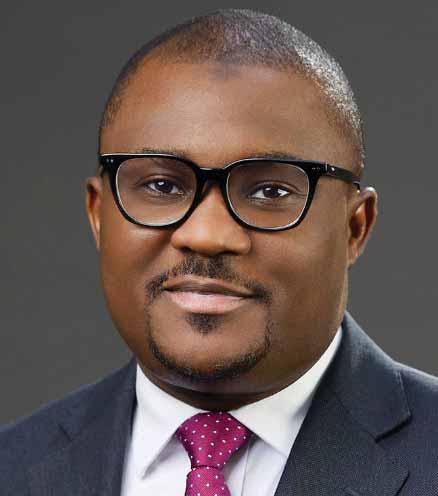
Olowo
They added that true independence for regulators like the FRC is critical. In many jurisdictions, similar bodies operate with a high degree of autonomy, safeguarded by the very laws that establish them. Granting the FRC the same independence, they argue, would enhance its credibility, strengthen regulatory oversight, and align Nigeria with global best practices.
According to them, the notion that regulated entities should influence how they are monitored introduces a structural flaw into the governance system—one that could embolden corruption and trigger avoidable corporate failures.
While the OPSN’s willingness to engage government on key economic issues is a welcome development, it must avoid actions that could be interpreted as undermining the law or pushing regulatory agencies to overstep their legal mandate.
James Emejo
The Monetary Policy Committee (MPC) of the Central Bank of Nigeria (CBN) recently after its 301st meeting, decided to retain all monetary policy parameters, including the Monetary Policy Rate (MPR), the benchmark interest rate, unchanged at 27.50 per cent.
The MPC also retained the asymmetric corridor around the MPR at +500/-100 basis points, Cash Reserve Ratio of Deposit Money Banks at 50 per cent and Merchant Banks at 16 per cent, and left the Liquidity Ratio unchanged at 30 per cent.
CBN Governor, Mr. Olayemi Cardoso, explained that the resolution aimed to sustain the current momentum of disinflation, and sufficiently contain price pressures.
It was the third consecutive time that the central bank had kept interest rate at current levels, after several months of monetary tightening to tame rising prices of goods and services amid foreign exchange issues which had now been relatively subdued.
The MPR is the rate at which the central bank lends to commercial banks and often determines the cost of funds in the system. Businesses have blamed the rising cost of products on high cost of production linked closely with high borrowing costs.
Experts believe that monetary tightening remained a two-edged sword – while it is crucial to raise rates to woo Foreign Direct Investment (FDIs) into the domestic economy, it leaves businesses groaning under high borrowing costs.
On the other hand, the apex bank had attributed its tight monetary regime to inflationary pressures.
Cardoso had since inception of office, made inflationtargeting a cardinal policy focus of his administration.
He had variously defended the bank’s need to address the high inflationary environment to encourage international investors who detest such conditions.
At a recent meeting with investors early in the year, Cardoso stressed that it was of no use for businesses to
harvest high returns in an inflationary environment.
He had thus vowed to pursue price stability, a core mandate of the apex bank.
Cardoso reiterated his stance that the CBN’s policy toolkit is working, and therefore, reining in inflation, noting that the target was to cut inflation to a single digit.
However, it is unclear, whether the apex bank will achieve this aim before reducing MPR.
He said, “We also recognise that our goal is to ensure that we get to single-digit rate. So, much as it is coming down, we’re still determined to ensure that we bring it down to single-digit.
“I want to say that upfront. Let us also remind ourselves a little bit about where we’re coming from. We are coming from a situation of enormous money supply, and I’ve spoken about this in different fora. I’ve spoken about the huge injections that went into our economy from Ways and Means unprecedented and probably difficult to find any other place to compare it with.
“I’ve also spoken about the huge intervention injections that went into our economy and still, quite frankly, are with us. Those things are of such a proportion that they just simply do not disappear overnight.
“Those are some of the challenges that we have to cope with, and that is why our response to this is that we are operating a very tight monetary situation.
“We have absolutely no choice but to do that. It’s at a cost, but it needs to be done if we are going to achieve the single-digit inflation rate I spoke about - these are part of the measures.”
He said, “In addition to that, I want to say that there are upside positives that will complement the work of the central bank. For example, we are aware that for a while there have been issues with respect to revenue coming in from the oil and gas side.
“Now there are very, very positive shoots coming out on that, we see that the NNPC has, for the first time since January of this year, has published the fact that we are meeting our OPEC quota. That’s very good news.
“It’s very good news, and it all adds to the very, positive trajectory ahead. Of course, there’s also greater transparency with respect to NNPC and its earnings, and of course, it’s coming into its account and to the monetary authorities.
“I saw something on television just before I came in here, where they were publishing their monthly profits. That’s also very encouraging. It’s very encouraging.”
According to the CBN governor, “I think some of these areas will basically help to bring down the inflation that we are talking about. We are also ensuring that the handshake that is supposed to take place between the fiscal and monetary side, which is very important, the close coordination that needs to take place between the two is going to continue.
“And I was privileged again to have been called on to address the NNPC first retreat in which we had very useful discussions, and which I believe, showed for greater collaboration.
“As we go along, we will continue to use our tools, the MPR, the CRR, ensuring that the foreign exchange market works efficiently. We are going to continue to do that, and you can rely on us for that, and of course, the inflation expectations, we will manage them in such a way that we are as transparent and open as possible, so that people understand, the various publics understand where we are headed.”
“But in summary, we are determined to ensure that we can we use all the different tools at our disposal to bring down inflation to single-digit levels,” Cardoso added.
Though prior to the recent MPC meeting, there were expectations from analysts that the central bank would consider a rate cut, given that inflationary pressures, according to the CBN governor, were beginning to wane. Cardoso said maintaining a hold on policy stance would continue to address existing and emerging inflationary risks, stressing that the MPC would continue to undertake rigorous assessment of economic conditions, price develop-
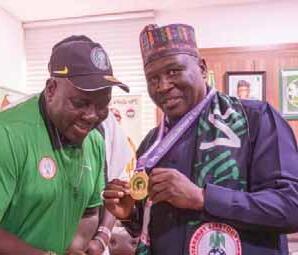

WhenSpanishLigaclub,AtleticoMadridannouncedinmid-MaythisyearthatSuperFalcons captain,RasheedatAjibadewillleavetheclubattheendoftheseason,andwithoutevenarumour onhernewdestination,thoughherabilitywasneverindoubt,therewerefearsinsomequarters thatherconcentrationlevelmighthavebeenaffectedand,withthe2024WAFCONjustfew weeksaway,the25-year-oldmaynotbeathersuperlativebestinNigeria’squesttowina10thtitle. However,againstallodds,theformerFCRobonotonlyledtheFalconstoaLaDecima,butalso emergedastheTournament’sMost ValuablePlayer,therebyplacingherselfingoodsteadforthe Women’sPlayeroftheYearinDecember
Rasheedat Ajibade was not only instrumental in inspiring the Super Falcons to a historic achievement, winning 10 of 13 editions, the 25-year-old emerged as the WAFCON 2024 Woman of the Tournament.
From the opening whistle to the final game, she stood tall even when the odds looked like they were against her. Just like the leader that she is, she displayed her relentlessness, embraced the moment and never looked back.
When she was invited to the photoshoot with the new WAFCON trophy prior to the start of the tournament at the iconic Hassan II Tower, she looked at it and promised herself that Nigeria would lift this beautiful crown. It is that will to gather her troops every time that they walked onto the field that led her to this moment – the moment where Nigeria, once again, conquered Africa.
Vocal on and off the field, Ajibade has shown her quality every time that she has stepped onto the field of play. The blue-haired girl from Lagos poured her heart into this campaign, often seen urging her teammates to stay locked-in (even if it helps that they are already motivated.)CHECK THIS
When her team needed a spark, she lit it. In whatever role she was assigned, she scanned for spaces (occasionally,)? OR ALWAYS, made passes in the tightest of angles and kept Nigeria’s opponents guessing. She exploited the athleticism of her team in ways that came faceto-face with the weaknesses of their opponents and with that, she dictated the tempo of each game.
She earned three Woman of the Match Awards against Botswana, Zambia and South Africa, while finding the back of the net once – a penalty against South Africa’s Andile Dlamini, (who was yet to score until that point.)WHO WAS YET TO SCORE?
This is the second time that Ajibade is being awarded at the WAFCON, after she walked away with the Joint Top Scorer Award at the 2022 edition – tied with Ghizlane Chebbak of Morocco and South Africa’s Hildah Magaia. For Ajibade, two WAFCON titles in the bag and a silver medal on top of the individual awards, this is the stuff of dreams. The stage was set in Morocco and this time, the Nigerians achieved their revenge. The Atlas Lionesses had stunned the Super Falcons in the semifinals three years ago (5-4 penalties; 1-1) after the latter went down by two players.
As Ajibade received her award inside the Olympic Stadium in Rabat, emotional after this achievement,

she appreciated the recognition. An inspiration to many a girl in Africa and the world, Ajibade continues to write her own chapter in a sea of success at home and abroad.
Former Super Falcons goalkeeper, Judith Chime believes that Ajibade is worthy of her being voted the Most Valuable Player, following her exceptional displays and leadership at the just-concluded Women’s Africa Cup of Nations tourna ment in Morocco.
The former FC Robo winger was voted three Woman of the Match awards in the six matches she was involved in, as Nigeria claimed a record-extending 10th WAFCON title, following the team’s come-from-behind 3-2 victory over the hosts in the final at the Olympic Stadium in Rabat last Saturday.
In an interview with Lagos Talks FM, Chime said, “Rasheedat Ajibade was the correct choice for the WAFCON Most Valuable Player of the Tournament. She deserves it. She deserves every victory, every celebration, every salute.
‘’I’m very excited. I said a couple of times that Mission X is not just all about the girls who played. It is for every lady, every woman who is out there. I celebrate the young girls who just made it happen once again. It is not an easy task.’’
Ajibade indeed expressed her emo-
tions and gratitude in a heartfelt post on X on Monday, describing the achievement as more than just a title, writing, “We did it! Mission X accomplished! Words can’t fully express what this moment means. This isn’t just our 10th WAFCON trophy; it’s a testament to the relentless spirit of this team. Every tackle, every pass, every moment of pure grit on that field was for each other, for our country, and for every single one of you who believed in us.”
Ajibade indeed urged the rest of her Falcons teammates not to rest on their laurels after winning the WAFCON 2024 tournament in Morocco.
Justin Madugu‘s side defeated Tunisia, Botswana, Zambia and South Africa en route to the final, before a brilliant second-half comeback saw them dispatch the Moroccans on home soil.
In her captain’s speech before President Bola Ahmed Tinubu and his wife, Oluremi, Ajibade urged her teammates not to relax after their WAFCON victory. Instead, she urged them to raise the bar high and become world beaters.
“We are not content to rest on our laurels. Our vision is bold; we want to become the best football team in the world,” the former Atletico Madrid Femeni midfielder said.
Additionally, the 25-year-old issued
a plea to the Nigerian Government and the NFF, to support the Super Falcons with world-class facilities that’ll help them compete on the biggest stage.
“We dream of standing on the global stage, not just as competitors, but as Champions. But to achieve this, we seek the support of the Government and the Nigerian Football Federation.
“With their partnership, we can have world-class facilities, and we’ll be able to prepare in the best way possible and create the pathway for the next generation of Super Falcons to soar even higher.
“Together, we can show the world that Nigeria isn’t just a participant in global football, but a leader. Football is a unifier in this country; it brings the nation together, oneness across tribes and religion.
“We want to continue to bring joy to the nation and more Nigerians around the world. Together, with the right support, we can level the playing field with our competitors.
“Together, we can achieve greatness that’ll echo across generations. The Sky is just the beginning,” Ajibade concluded.
Ajibade exited Atletico Madrid upon the expiration of her contract at the end of the 2024/2025 season and is still without a club.
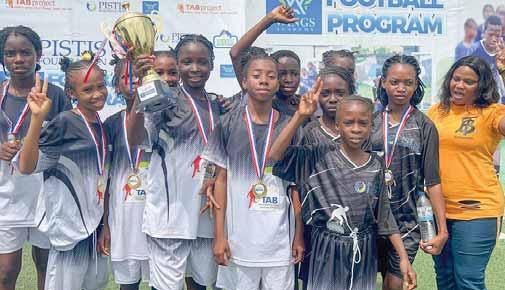
More than 100 children from underserved communities in Lagos have been positively impacted by the Wings Acad- emy Football transformativeProgramme—a youth initiative by Pistis Foundation, in col- laboration with The Asumah Brothers (TAB).
Spanning seven weeks, the programme kicked off with a Novelty Match on June 21 and concluded with a vibrant Championship Match on July 26. It offered structured football training and life mentorship to boys and girls from Jakande, San- gotedo, and Ibeju-Lekki areas of Lagos DesignedState. to instill purpose,
discipline, and confidence, the initiative featured four community-based teams, including participants from the Kids-Off-The-Street (KOTS) Shelter, the Jakande community, Lekki Soccer Academy and The Destiny Trust Foundation.
Throughout the pro- gramme, participants engaged in weekly technical drills, team-building exercises, and competitive matches, while also receiving mentorship focused on leadership, dis- cipline, and teamwork.
“Beyond the matches and goals, our goal is transforma- tion,” said Saheed Adenekan, Programme Coordinator at
Pistis Foundation. “These kids now see themselves as more than their backgrounds—they see possibilities.”
The Championship Match marked the culmination of six weeks of intensive training in ball control, tactical play, fitness, and shooting. In a thrilling final, Jakande FC Boys clinched the U13 Male Trophy, while the KOTS Ladies emerged champi- ons in the U13 Female category, earning cheers from community members, partners, and guests.
“It was my first time playing in a real tournament,” shared Divine Asukwo, a 12-year-old from Jakande FC. “I was shy at first, but now I feel confident and want to keep playing football.”
Tayo Atoloye, the SouthWest Zonal Representative on the Nigeria Cricket Federation (NCF) Board, has reflected on his impactful four-year tenure, highlighting key strides in infrastructure development, grassroots engagement, and policy reforms across the region.
A former Nigeria international cricketer, Atoloye brought both playing experience and administrative vision to the board, earning commendations from stakeholders for his results-driven leadership.
Central toAtoloye’s achieve-
ments is the construction and renovation of training facilities across all six states in the Southwest—Lagos, Ogun, Oyo, Osun, Ekiti, and Ondo.
“We worked in collaboration with the local authorities, state sports commissions, the NCF and community partners, to ensure that each state received functional cricket nets and training grounds,” Atoloye said.
“One of the standout accomplishments was establishment of Nigeria’s first-ever indoor cricket training centre, The Cricket Lab, at the TBS Oval in Lagos, which relieves the NCF and has contrib-
uted immensely to the capacity development of our players and it has given our coaches the opportunity to transfer knowledge in a conducive environment.”
In addition to infrastructure, Atoloye focused on improving access to equipment. He organised and partly financed multiple donation drives, distributing essential kits such as bats, pads, and balls to schools and clubs throughout the region. His efforts, backed by private sponsors, significantly reduced the financial burden on families and increased participation at the grassroots level.
After scaling through the national trials in April, Kalu Chijioke (Jnr), had set his eyes on the 2025 FISU World University Games in Germany between July 7 and July 27, but it was not to be as Nigeria’s Taekwondo prospect, missed the chance to represent the country.
Kalu earned his spot after an impressive performance at the National Trials held in April, which featured over 500 participants from 40 Nigerian universities.
The trials were held at the
NDLEA Academy Ground in Lamingo, Jos, as a selection event for Nigeria’s FISU Games delegation.
The FISU World University Games, a major global multisport event, took place in six German cities from July 16 to July 27. Kalu, a Statistics student at FUTO, was seen as a strong medal hopeful after winning bronze in the -80kg Taekwondo category at the 2024 National Sports Festival in Ogun. However, he missed the Games due to registration
issues caused by poor planning and alleged corruption by FUTO’s sports officials.
FUTO’s Director of Sports, Dr. Nnennaya Anyanwu initially refused to comment when approached about the issue. She later told NANthat only the NUGAPresident could respond to questions on athlete preparation for the Games.
FUTO’s Dean of StudentAffairs, Prof. Chikwendu Orji, said he remained “hopeful” of FUTO’s participation, despite the missed deadline.
As the 2025 MASA Isonyin Marathon draws near, excitement is building across Ogun State, with strong endorsements from top athletics officials and respected community leaders lending greater credibility to the fastrising long-distance race.
The event, scheduled for August 23, 2025, will mark the second edition of the marathon and is expected to host over 2,500 runners competing for nearly N10 million in prize money. It
has become one of the most anticipated sporting events in the region, thanks to growing grassroots support and a vision to promote health, tourism, and talent discovery.
The Chairman of the Ogun State Athletics Association, Chief GbengaAbijo, described the Isonyin Marathon as a timely initiative that aligns with the state’s renewed focus on sports development.
“We are seeing progress in track events, but it’s also important to encourage long-
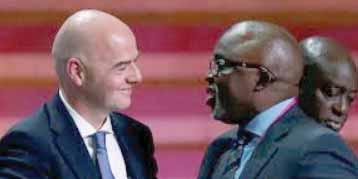
By Azuka Chiemeka
In recent years, the Nige- rian sports economy has witnessed a gradual but promising rise in local con- tent participation, particularly in sportswear manufacturing. Homegrown brands like OWU, Zenith, Haggai, Cone, and manufacturers from Aba have become staples among Nigerian football clubs and in open markets. By reducing the need for imported kits, they help conserve foreign exchange, generate local employment, and contribute to the nation’s GDP.
With this positive trajectory, expectations naturally grew for indigenous players to expand into sports hardware produc- tion, facility development, and stadium construction. That expectation appeared to be answered in 2020 when FIFA, under its Forward 2.0 programme, approved the construction of two ministadiums in Nigeria — one in Birnin Kebbi, and another in Ugborodo, Delta State.
At the time, then-President of the Nigeria Football Federa- tion (NFF), Amaju Pinnick, a native of Ugborodo, saw an opportunity to deepen the lo- cal content drive and positively impact his community. While the Birnin Kebbi project was awarded to Enron Construction, Pinnick advocated that the Ugborodo project be given to a Nigerian-owned firm. That firm was Monimichelle Sports Construction Company, led by Bayelsa-born Ebi Egbe with the agreement for the Construction of the NFF/FIFA Forward 2 project signed on the 15th of September, 2020.
The location of the project in Ugborodo was symbolic. As part of the oil-rich Escra- vos region, which contributes roughly 29% of Nigeria’s crude oil, the community has long felt marginalised in terms of federal infrastructure. The stadium was envisioned as a tool for inclusion, youth empowerment, and peace-building. It also carried an additional weight: an Ijaw man was being trusted with a landmark project in the heart of Itsekiri land.

distance running,” Chief Abijo said. “Events like the Isonyin Marathon provide opportunities for our athletes to grow, gain exposure, and stay motivated throughout the year.”
Adamawa State Governor, Ahmadu Fintiri, has gifted Super Falcons coach, Justin Madugu, a three-bedroom bungalow and N50 million for leading the national women’s football team to victory at the 2024 Women’s Africa Cup of Nations.
According to a Facebook post by the governor’s aide, Pius Iliya, the presentation was made at the Government House in Yola, the state capital. Madugu, an indigene of Adamawa, was hailed by Fintiri for his role in the Falcons’ triumph at the tournament, which took place in Morocco
Pinnick didn’t just push for the project — he backed it. Reports indicate he personally funded initial documentation, secured necessary approvals, and even accompanied the contractor on familiarisation visits to Ugborodo elders and youth leaders to galvanise support.Buoyed by this, the Delta State Government under Governor Ifeanyi Okowa awarded a contract for the construction of an access road to the site. Hopes were high. The community believed a long-awaited change was near.
But over four years later, that dream has become a source of bitter disappointment.
While the Birnin Kebbi stadium was completed and commissioned over two years ago, the Ugborodo project remains abandoned. Despite receiving $650,000—approxi- mately 55% of the $1.1 million contract sum—in two tranches, Monimichelle’s work stalled after basic site clearing and an incomplete spectator stand.
In a 2022 interview with BSN Sports, the contractor confirmed receipt of the funds but claimed that about 15% was deducted by the NFF for taxes and bank charges, which he ar- gued should not have applied. However, NFF sources insist all deductions were made in line with global best practices and that Enron Construction faced similar tax deductions without complaint.
What followed raised even more eyebrows. The contractor applied for a variation, arguing that he was unaware of the site’s difficult terrain because he had not visited it before accepting the contract—a revelation many deemed unprofessional and shocking for a company of Monimichelle’s claimed pedigree.
The NFF, after several site inspections, determined that the work done was not commensurate with the funds released. They insisted on further progress before releasing additional funds. Meanwhile, behind
earlier this year.
“Governor Ahmadu Umaru Fintiri, on behalf of the Government and people of Adamawa State, has gifted Justine Pwanidi Madugu ( Coach of Nigeria’s Super Falcons) a three-bedroom bungalow and a sum of N50m for leading the team into winning the 2024 Women African Cup of Nation that took place in Morocco this year,” the post read.
The gesture comes weeks after the Super Falcons clinched a record-extending 10th WAFCON title, reaffirming their dominance in women’s
the scenes, Monimichelle ap- proached Pinnick for financial assistance to continue the project. Pinnick reportedly loaned him $100,000 and later million, both backed by signed documents. But the project status didn’tWithchange. no refund forthcoming, Pinnick petitioned the police. Monimichelle admitted to receiving the loans but claimed he would only repay once the NFF released the balance of the contract. Caught in the middle of a standoff, the NFF had no choice but to terminate the contract. Now, with FIFA’s reputation on the line, the NFF is considering collaboration with the National Sports Commission to complete the project, while also exploring legal avenues to recover the disbursed funds.
Unfortunately for Pinnick, what began as a legacy project for his community has morphed into a source of suspicion and political attacks. Critics like Yemi Otuedon have taken to social media, accusing him of using the stadium project as a front to acquire land — a claim unfounded, as the land was not allocated to him. Even worse, some critics have chosen to overlook Pinnick’s numerous contributions to the development of Itsekiri land. These include a FIFA-approved synthetic pitch in Ode-Itsekiri (Big Warri), which was commis- sioned by the Olu of Warri, His Majesty Ogiame Atuwatse III, alongside HRM Anselm Edoni- jie II, the Ojuromi of Uromi. He is also the sponsor of the popular “Warri Again” concert, a platform that revitalises the city’s social life and gives a spot- light to young entertainers. His Brownhill Foundation has built sports courts at Hussey College, Warri, and Government College, Ughelli — his alma mater and the foundation has also provided indigenes and non-indigenes with scholarships worth hundreds of millions of Naira annually.
To mention a few, the three children of my late colleague, the late Timi Ebi- kagboro, who passed on in 2017, whom all his children are all exclusively sponsored by the foundation.
football on the continent.
The Falcons had earlier arrived in Abuja on Monday to a presidential reception hosted by President Bola Tinubu. Each player was rewarded with $100,000, while every member of the technical crew, including Madugu, received $50,000, three-bedroom apartments, and national honours of Officer of the Order of the Niger. The Falcons defeated host, Morocco 3-2, in the final of WAFCON with second-half goals from Esther Okoronkwo, Folashade Ijamilusi, and Jennifer Echegini.

L-R: Director General, National Institute for Legislative and Democratic Studies, Abubakar Sulaiman; Chairman, Code of Conduct Bureau (CCB), and newly inducted Honorary Fellow, Chartered Institute of Forensics and Certified Fraud Investigators of Nigeria (CIFCFIN), Dr. Abdullahi Usman Bello; Founder/Chairman, Governing Council, CIFCFIN, Dr. Iliyasu Gashinbaki; and Registrar/Chief Executive, Dr. Isa Salifu; during the Institute’s Professional Practice/13th direct membership graduation and Fellowship awards in, Abuja…yesterday KINGSLEY ADEBOYE

Africa’s leadership landscape is littered with broken promises, twisted constitutions, and battered democracies, mainly due to sit-tight syndrome. Across the continent, a growing number of leaders seemS unwilling to relinquish power, clutching onto it with tenacity that defies democratic norms.
From Cameroon to Uganda, Ivory Coast to Equatorial Guinea, and many more, the pattern is disturbingly familiar. These politicians ascend to office with popular support, consolidate power, amend the constitution, and remain indefinitely. In others, like Togo, dynastic succession and manipulated elections have turned the democratic process into a farce. These leaders preside over countries plagued by poverty, insecurity, and corruption, while ignoring the real cost of overstaying in office. This unfortunate situation was demonstrated in a recent skit by popular Nigerian comedian, Kevinblak, which depicted how they hold onto power even in death.
Indeed, sit-tight leadership erodes public trust, weakens institutions, stifles innovation, and breeds instability. For instance, reports that emerged from Uganda a few days ago showed that its long-serving President, Yoweri Museveni, 80, has been declared the governing party's candidate in next year's presidential election, opening the way for him to seek to extend his nearly 40 years in power.
In his acceptance speech, Museveni said he was responding to the “call” and, if elected, would press ahead with his mission to turn Uganda into a "high middle-income country." Museveni has ruled the East African country with an iron hand since he seized power as a rebel leader in 1986. He has won every election held since then, and the constitution has been amended twice to remove age and term limits, allowing him to remain in office.
Pop star-turned-politician, Robert Kyagulanyi, popularly known as Bobi Wine, who is the major face of opposition in the election scheduled for next January, has continued to face growing state repression. Another prominent opposition politician in the country, Kizza Besigye, has been in detention since November after being accused of treason.
In Cameroon, the electoral commission recently rejected the candidacy of Maurice
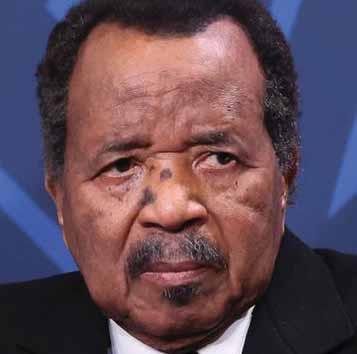
term, as he seeks to extend his rule into a second decade after scrapping term limits in 2023. Since taking office in 2016, Touadera has enlisted outside forces to stay in power amid a persistent civil conflict, including mercenaries from Russia's Wagner militia, who intervened in 2018 on the side of the government.
Togo’s Faure Gnassingbé is also on a similar path as his 2024 constitutional reforms scrapped term limits and converted the presidency into a Council of Ministers position with indefinite renewable terms, effectively consolidating political control. His family has ruled the country for 58 years, as he took over in 2005 from his father, Gnassingbé Eyadéma, who had ruled for almost four decades.
effect on the continent’s overall progress and development.
Kamto, President Paul Biya’s main rival, in an upcoming presidential election. Biya, 92, the world’s oldest serving head of state, said last month he would seek re-election on October 12, despite rumours that his health is failing. He has been in power since 1982, nearly half his lifetime. Kamto, 71, was considered Biya’s strongest rival in past elections.
"At 92 years old, Paul Biya is older than the atomic bomb, older than space travel, older than the United Nations, the computer, and even the internet," a television presenter quipped in a humorous video circulating on social media.
The story is not different in Ivory Coast, where President Alassane Ouattara has announced he will seek a fourth term to continue to lead the West African nation, with many heavyweight opposition candidates excluded from the race. With the country’s most high-profile opposition politicians ruled ineligible, Ouattara is now the frontrunner. The 83-year-old president has led the country since 2011.
Already, two main opposition parties have been banned ahead of the presidential election. They are the African People’s Party of Ivory Coast (PPA-CI) – led by former president Laurent Gbagbo – and the Democratic Party of Ivory Coast (PDCI), the country’s largest opposition force, headed by former international banker Tidjane Thiam.
Teodoro Obiang Nguema Mbasogo has continued to rule Equatorial Guinea since seizing power from his uncle in a coup in 1979. Equally, in the Central African Republic, President Faustin-Archange Touadera, last week, announced that he will run for a third Biya
In the same vein, Ismaïl Omar Guelleh, the President of Djibouti, in 1999 extended his rule through constitutional reform, and he has not ruled out running for a sixth term in next year's election. Paul Kagame, Rwanda’s President, has been in power since 2000.
Many of these leaders were once hailed as liberators or reformers. But somewhere along the way, they became captives of the very power they once claimed to wield for the people. They now fear what comes after office, and in that fear, they sacrifice national progress for personal survival. Their refusal to leave office turns leadership into a zero-sum game, where succession becomes a threat rather than a democratic transition.
Regrettably, the voices of the youth, which is the largest demographic on the continent, are drowned out by gerontocratic regimes that no longer represent their aspirations, with civil society routinely muzzled. Electoral commissions are captured and controlled by the ruling governments.
Unfortunately, the African Union has no voice on the challenges posed by the sit-tight syndrome.
But silence is no longer an option. If Africa is to rise, economically, socially, and politically, then it must confront this curse head-on.
Leadership must not be a life sentence. Power must be seen as stewardship, not ownership. Term limits must be respected, not in theory, but in practice.
This is because the continent continues to suffer from leaders extending their terms in office and adopting rigid mindsets. The despotic nature of these dictators has not only caused immense suffering for the majority of the populace but has also had a detrimental
The issue of conflict, which takes different forms and leads to loss of lives and property, forced displacement of a sizable population, refugee crises, poverty, starvation, and the continent’s general underdevelopment process, comes at the end of these leaders’ attempts to perpetuate themselves in power. Corruption is another factor that draws people to the sit-tight leadership mentality found in several African nations. Most of these African presidents enter public service with the ulterior motive of accumulating fortunes at the expense of the community. African leaders need to understand that the only thing constant in life is change and that everything is constantly changing. Therefore, it becomes quite unsettling to see how an African leader finds it extremely difficult to abide by the constitution’s provisions regarding the terms of office, and will do everything in their power to prolong their tenure—even in the face of resolute opposition from the populace, which frequently pays with their lives.
Periodic change in political leadership through a democratic process makes leaders accountable to the people they represent. The threat of being voted out of office encourages responsiveness to public needs and concerns.
Democratic processes ensure that a wider range of voices and perspectives are represented in government. This leads to policies that better reflect the interests of the entire population. Additionally, competition for power inherent in democratic elections encourages political parties and leaders to offer innovative solutions and policies to appeal to voters. Regular changes in leadership reduce the risk of entrenched power and corruption.
Democratic processes provide mechanisms for removing leaders who misuse their authority and reinforce the idea that no individual or group is above the law, strengthening the foundations of a just society. What Africa needs are bold, visionary leaders who understand that greatness is not measured by how long you stay in power, but by what you do with the time you’re given. Leaders who build institutions strong enough to outlast them. Leaders who prepare successors and step aside with dignity. That, and not indefinite rule, is the true legacy worth leaving behind.